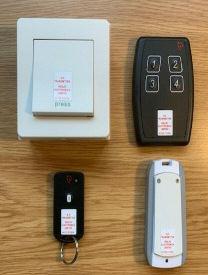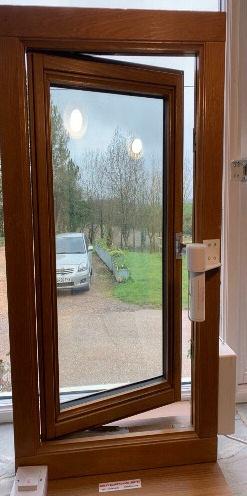




























One of the main issues when choosing a home lift is a lack of space. However, Terry Lifts, the UKbased specialist in mobility lift solutions, has developed a design to address this significant problem, offering an attractive alternative to a traditional STAIR LIFT.
The recently launched Affinity Home Lift has been specially designed to fit even the narrowest of spaces, such as alcoves or stairwells, which means it can be installed where others can’t. This solves a significant dilemma and makes this contemporary, two-person, two-stop standing home lift an exciting choice for homeowners.
Similar in design to Terry Lift’s best-selling Lifestyle Home Lift but with a more compact footprint, the Affinity Home Lift combines style and comfort with unrivalled flexibility. It safely and comfortably takes you between floors, enabling you to maintain your independence and continue to enjoy your home to the fullest.
You can forget about bulky, obtrusive rail supports as the model’s discreet rail guides fit neatly against the wall, and its compact design enables easy installation without interfering too much with your existing furniture layout. Additionally, the cabin’s clean, modern design means that colour and finish possibilities are endless, perfectly complementing your existing home decor.
With laminated safety glass as standard, pressuresensitive surfaces, and easy-to-use manual lowering, every feature has been carefully considered to elevate your home environment while prioritising your safety and comfort.
With over 50 years of experience designing and manufacturing both public access and domestic home lifts here in the UK, you can trust that Terry Lifts meets the highest standards in quality and safety and exceeds regulatory compliance. The Affinity Home Lift

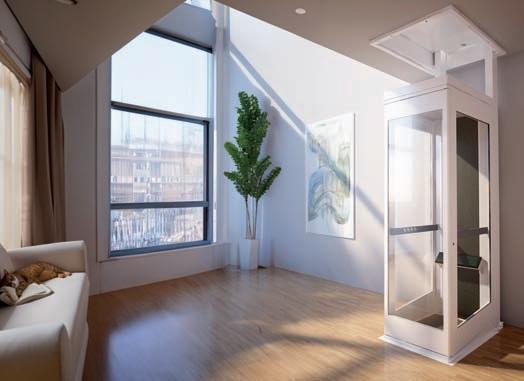
is, of course, no different. Fitted by expert installers trained by the Terry Training Academy, building control approval and lifetime testing to ensure reliability come as standard.
Dave Allen, Managing Director, added: “With the new Affinity Home Lift, you can trust you’ve found the perfect home lift solution to meet your needs – no matter how tight you are for space.”
Terry Lifts has been a trusted name in the lift industry for more than 50 years, meeting the highest standards in quality and safety.
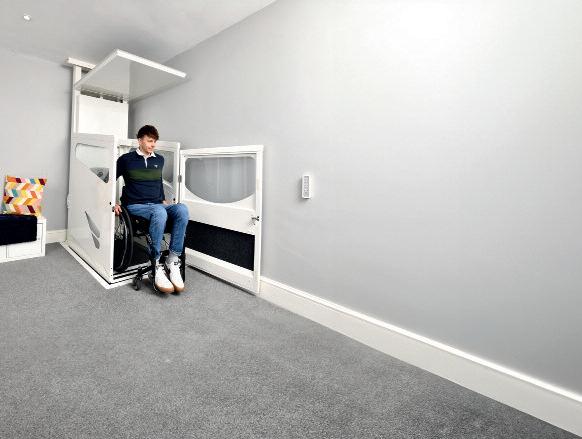
When it comes to finding a lift, you can be sure the one you’re looking for will be the one you find at Terry Lifts.
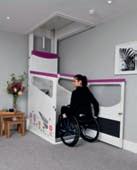
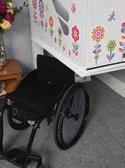






7 Montgomerie Terrace, Ayr, KA7 1JL
Tel 01292 287574 Fax 01292 266656 email: abilityneeds@btinternet.com web: www.abilityneeds.co.uk
All Rights Reserved
No part of this publication may be reproduced or used in any way without written permission of the publisher. The views expressed in this magazine are not necessarily those of the publisher and although every effort has been made to ensure that the information is accurate, the publishers take no responsibility for errors and omissions. No responsibility can be accepted by the publishers for any claims made by the advertisers in this publication.
3 Motoring and Mobility
18 Tanni’s View
24 Eddie Peacock
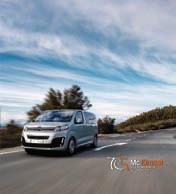










- Featuring the latest vehicles and products available in the mobility marketplace
- Baroness Grey-Thompson DBE – Tanni looks forward to the Paralympic Games in Paris and points out that the promises made on accessibility on the metro don’t appear to have materialised
- A smile goes a long way…. – Eddie discusses how a smile and sense of humour can go a long way in helping those who are experiencing challenges in life
28 Industry Insight
- Are we slaves to technology? – Angus wonders if technological advancement is not always necessarily progress and that sometimes the old way is still best
34 Cheryl Everitt
- Dreaming of Italy: An escape to the sleeping beauty of Mantua –Cheryl whisks us off to Mantua in the Lombardy region of Italy
43 Tea Break
- Take a break and put your knowledge to the test
Purchase a digital copy of Ability Needs at www.magzter.com Follow us on

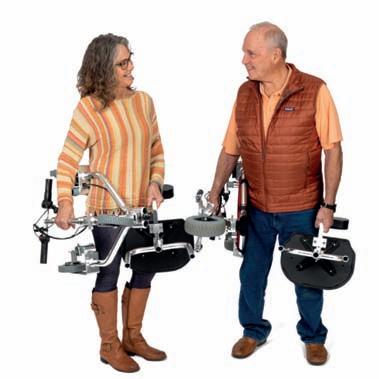

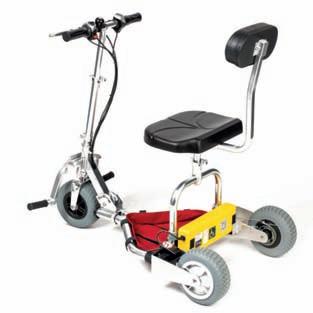
TRIRIDE ARE A market leader in the production of Power Add-on devices. Whether you want full electrical assistance, or a Hybrid assisted handcycle we have you covered. Simply attach to your manual wheelchair in seconds and discover a new Freedom.
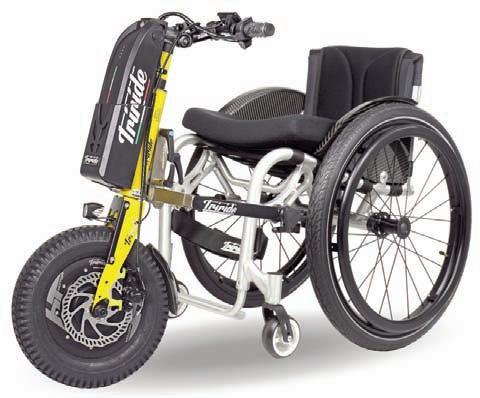
The Triride Special Compact HT with all road tyre is a great all-rounder providing full electronic assistance. Small, compact, packed with plenty of
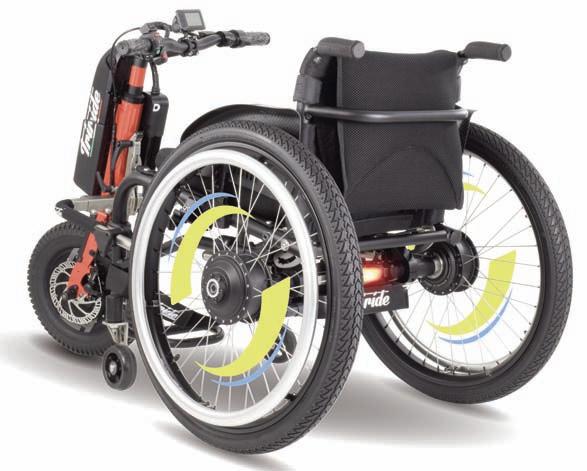
power to tackle those steeper inclines and handle some off-road use, but small enough and light enough to transport in the boot of your car. Triride technology compliments the drive performance with Intelligent Cruise Control and
Intelligent Braking System makes driving with family and friends a breeze. Paired with Triride’s patented attachment method, fitting to most manual wheelchair is possible and customisable to each individual user requirements.
Wanting to go off the beaten track further? Combine any one of our Triride or Tribike models with the ground breaking MTW Trekking system. The Trekking Power system is an easily attachable rear axle system that provides you with three wheel drive power and ultimate traction to tackle almost any terrain, truly know no limits with Triride and the Trekking Power system. With it’s multi use you know have 3 systems in one, indoor with joystick, Triride only for the city and MTW power for your trekking desires.











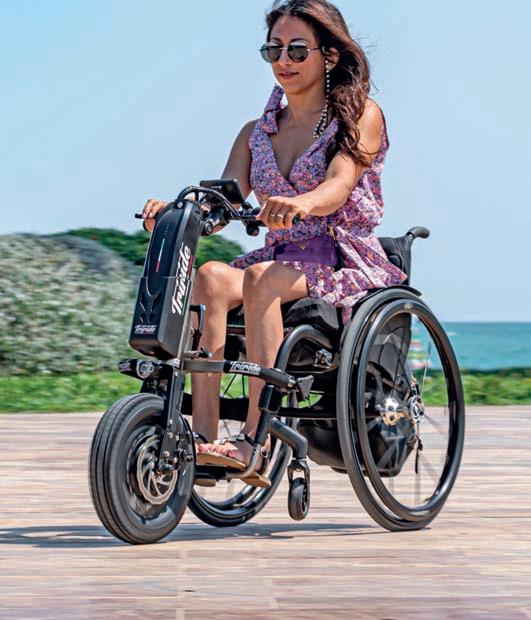

Humans crave social interactions – it is in our DNA – however, at some point in all our lives we experience emotions of loneliness and isolation. There’s no shame in feeling that way, which is why it is important to raise awareness and provide ways we can help our family and friends.
Here, Mark Hirst, who runs local in-home introduction service Hub Care Support Fareham alongside his wife Karen, discusses what loneliness is and how it is something to discuss all-year round –dispelling the myth that loneliness in the elderly peaks during the colder months – and he gives his top tips on how to reach out to anyone who may be feeling isolated this summer.
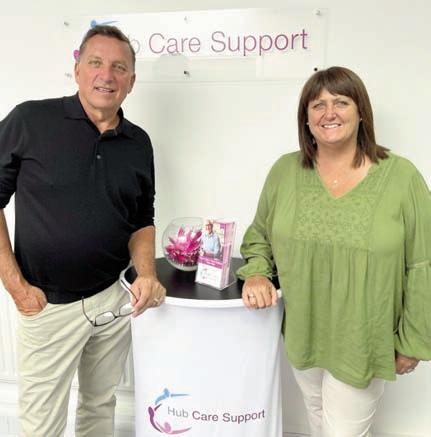
is an emotion that is more common over winter, especially around Christmas, but it is a feeling we face all year round. A recent study highlighted that 85% of UK adults had experienced loneliness in the last 12 months – irrespective of it being June or January.
We should start thinking about loneliness over the course of the year. If we quickly reflect on potential factors that could cause someone to feel isolated over the summer, we can name two or three straight away.
Firstly, it is important to establish that everyone’s experience of loneliness is different. Some ways we can experience loneliness are:
• Emotional loneliness – a lack of emotional attachment to someone like a close friend or partner.
• Social loneliness – a lack of friends to go out with, or who share your hobbies and interests.
• Existential loneliness – a sense of being in a room of people you know and still feeling alone.
Spotting loneliness can be easier if you know what to look for. Big events, such as moving to a new city or losing a loved one, can often lead to feelings of loneliness or isolation. Emotionally, someone might seem sad, unmotivated, or talk about feeling isolated. They might say they feel misunderstood or hopeless, even when they’re with others.
Behaviourally, people who are feeling lonely can withdraw from social activities and avoid gatherings. You might notice they’re less communicative, have changes in sleep or eating habits, or rely on social media for interaction – these shifts can signal that they’re feeling disconnected.
Talking about loneliness can feel daunting too. We often avoid tough conversations out of fear of embarrassing ourselves or hurting the ones we love –this can, unfortunately, unintentionally stigmatise loneliness further. So, how can we talk about it?
Checking in or reaching out to someone you think is experiencing feelings of loneliness, encourage people to consider the importance of random acts of connection –even those small connections like a simple hello or please and thank you can make a big difference.
Loneliness knows no season. We tend to think that it
Thinking about clients who have used our introductory service at Hub Care Support Fareham, they may experience loneliness during the summer for several different reasons. With families away on their holidays, elderly people might have fewer visitors and therefore less social interaction throughout July and August. Community centres and social groups may also slow down or close, limiting their chances to get out and socialise. The weather too can have an impact – the heat can sometimes make it harder to go outside safely Here are my five top tips to help us support the elderly and vulnerable who may experience loneliness: 1.Regular check-ins – stay connected through frequent phone calls, text messages or in-person visits. Regularly checking in shows that you care and helps them feel less isolated.
2.Encourage social activities – help them find and participate in community groups, exercise classes or volunteer opportunities. Joining these activities together can boost their social interactions and overall well-being.
3.Leverage technology – use technology to your advantage. It is a little outdated to assume your elderly loved ones aren’t tech savvy, but where you can, be on hand to help. Technology makes it easier to connect, even from a distance.
4.Involve them in activities – share simple activities like cooking, watching TV or going for a walk. These shared experiences provide companionship and help them feel more engaged and valued.
5.Practical support – offer help with everyday tasks like running errands, grocery shopping or household chores. Providing practical support can make a big difference in their daily lives and show them that they are not alone.


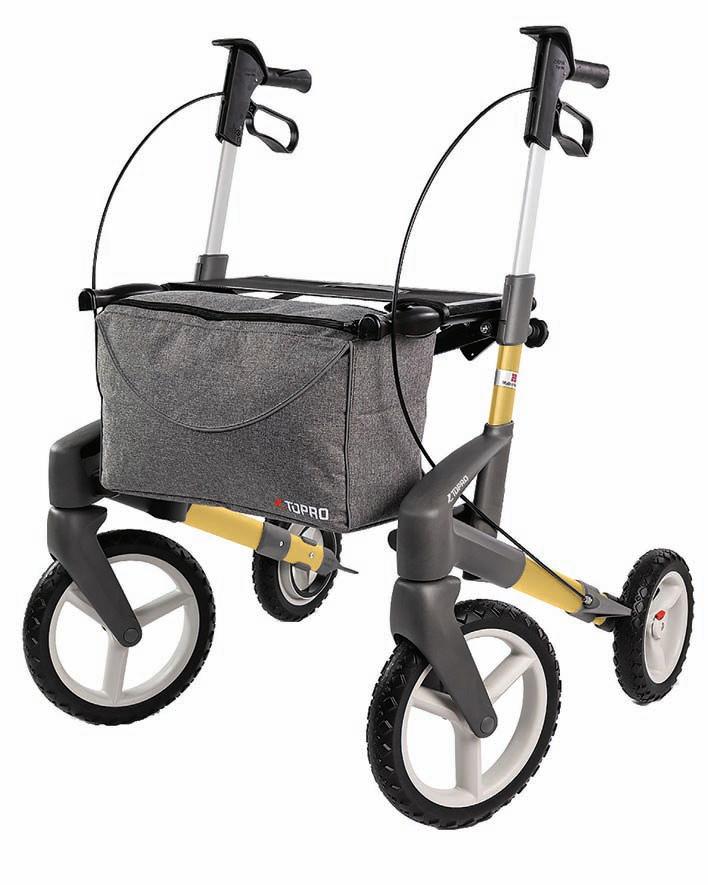





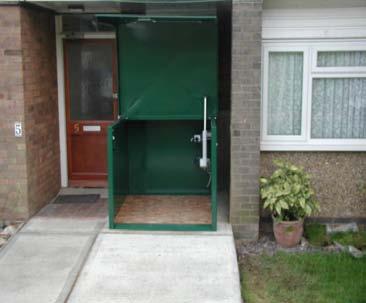
Scooter Store Limited is an established company with over twentyhas become very popular especially with the elderly and disabled community nationwide.
The concept is a small, secure store designed specifically for mobility vehicles, to be operated with minimal effort. This provides the user with more independence and effective storage for their scooter at home.
The Scooter Store was designed in response to a demand from the public as many mobility scooter users have struggled to store their scooters in living rooms, communal hallways etc, causing fire hazards and limiting their space. The Scooter Store is a fireproof, theft proof, compact alternative that will enable the user to securely store their scooter.
Our product has been extremely popular with the elderly and disabled community for over twenty-five years. worked with a multitude of local Housing Trusts/Associations, charitable organisations, County, City and Borough Councils to install Scooter Stores across the UK.
All Scooter Stores are manufactured from 2mm steel with a powder coated finish, push button controlled, fully lockable and include a socket for charging the scooter is provided inside the store.
Standard, Double and Bespoke sizes are available. The stores are delivered flat packed to allow installation to awkward sites. Stores can be relocated if required.
We also offer free site surveys to give advice on store locations, hard standing areas etc, if required.
The James Lind Alliance Priority Setting Partnership (PSP) is launching their second survey to understand the hearing and dementia research priorities of people who are deaf, or have hearing loss, tinnitus, hyperacusis or vestibular disorders.
Researchers working in this field have recognised for some time that hearing loss and dementia can occur together and have an impact on each other, but further research is needed for them to understand how.

In the previous survey, over 400 people submitted questions about dementia and hearing conditions that they would like future research to address. These included people living with dementia, people with hearing conditions, members of the Deaf community, and their supporters/relatives, clinicians and social care professionals. The questions they submitted cover diverse topics, including risk reduction, diagnosis, treatment and mechanisms.
The new PSP survey would like you to pick your top 10 questions for future research about dementia and hearing conditions.
Through these two surveys and a final workshop, the PSP wants to learn about your priorities for future studies about these conditions to ensure that research is shaped by those it
will impact: people living with these conditions and their health professionals. Who should complete the survey
• People living with hearing conditions (e.g., hearing loss, tinnitus, hyperacusis, balance disorders)
• People from the Deaf community (e.g., sign language users)
• People living with memory conditions (e.g., mild cognitive impairment, dementia)
• Supporters (e.g., family, close friends) of people living with hearing or memory conditions
• Health professionals (e.g., audiologists, nurses)
• Social care professionals (e.g., support workers, home help, care home staff)
• The general public
This survey will identify the most important questions collected in the 1st survey. This shortlist will then be taken forward to a final workshop in September 2024, where the direction of future research in this field will be decided.
If you would like to share your views on the direction of future research into hearing and dementia, please complete the survey by the end of July 2024 by visiting: www.jla.nihr.ac.uk/priority-setting-partnerships/
If you would like to share your views on the direction of future research into hearing and dementia, please complete the survey by the end of July 2024 by visiting: www.jla.nihr.ac.uk/priority-setting-partnerships/coexistingdementia-and-hearing-conditions/coexisting-dementia-and-h earing-conditions/

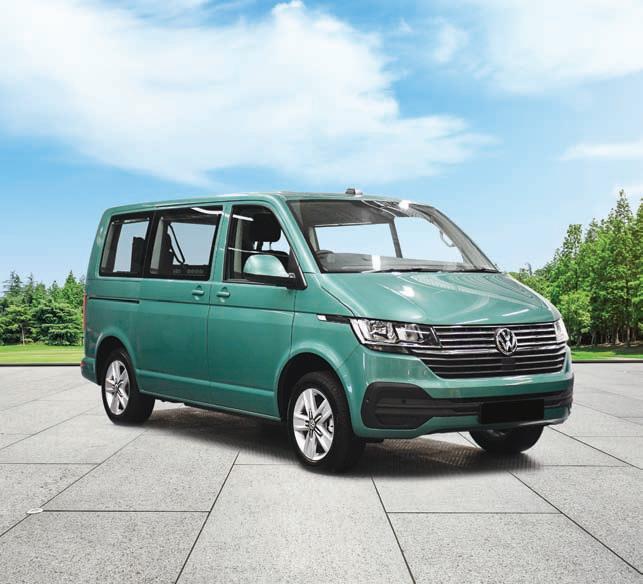









ACoventry University academic has completed a gruelling charity challenge in support of his brother-in-law who has Motor Neurone Disease (MND).
Thomas Hames, Course Director for Sport and Exercise Therapy, accompanied Luke Hames-Brown on the 84-mile, eight-day trek along the length of Hadrian’s Wall this month.
Luke, 35, was diagnosed with MND in April last year, having developed weakness in his leg the previous year. Despite the diagnosis, Luke, who has a background as a doctor and a volunteer for Search and Rescue, is hoping to inspire others struggling with difficult moments to build new memories even in the face of adversity.
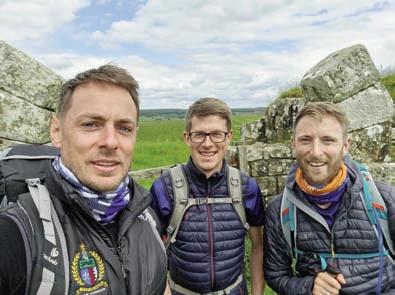
Burrow, whose tireless work has helped highlight MND.
Thomas said: “I think what Luke is doing is incredible - the positivity that he’s found deep inside himself to do this is amazing. He’s never wanted to stop just because he’s got Motor Neurone Disease. Both him and my sister Kate are strong people, they’ve always been determined to help others.
Thomas joined Luke and other relatives on the walk and they have so far raised nearly £45,000 for the My Name’5 Doddie foundation and the Motor Neurone Disease Association.
MND leads to muscle wasting and over time can impact how you walk, talk, eat and breathe. The average prognosis is 3 years after diagnosis. The disease has been the focus of national attention in recent weeks following the death of former Rugby League player Rob

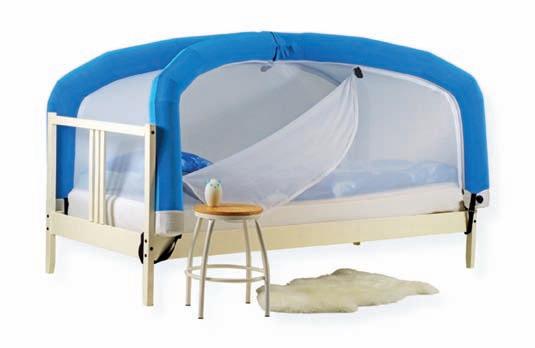
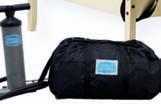
“Eight of us including me, Kate, our parents and Luke’s parents did the walk and a number of others joined us to do different parts of the route. It has been a challenge, both physically but also mentally, due to the emotive purpose of the fundraising. This might be the last time he’ll be able to do something like this, but he’s incredibly positive, this is a huge cause for him and the money raised will help fund research into MND to help future generations.”

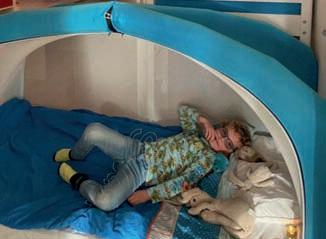


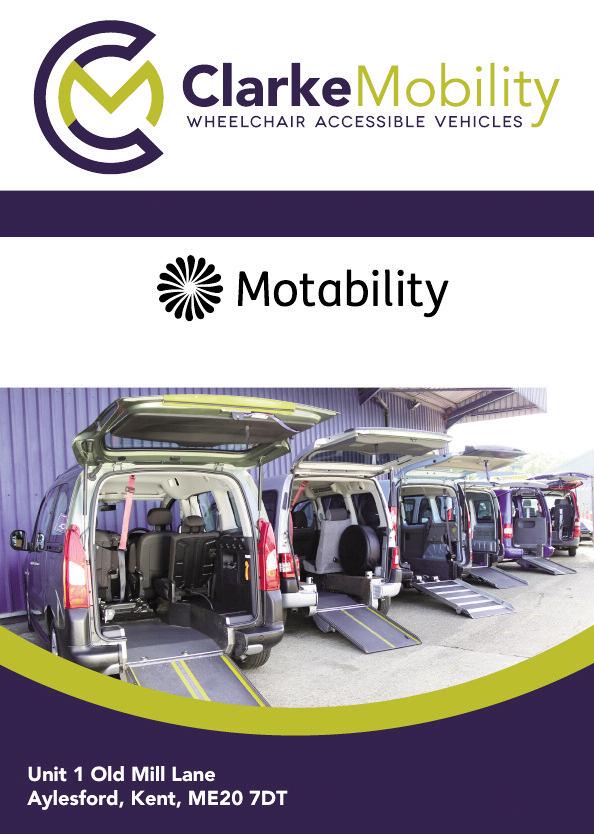
THE Motability Scheme works with a range of expert Wheelchair Accessible Vehicle (WAV) suppliers. They play a crucial role in helping customers get mobile and enjoy worry-FREE MOTORING.
You might already know the role they play in converting vehicles into WAVs, but do you know all the other things that WAV suppliers look after during your lease? Read on to find out how your WAV supplier will support you during your lease.
What do WAV suppliers help you with?
Your WAV supplier is your main point of contact during your lease with the Motability Scheme. They will be able to support you with a range of things, such as:
• Helping you choose the right vehicle for you
• Ordering and delivering your new vehicle
• Making sure you are comfortable with your new WAV
• Offering assistance when arranging your servicing, maintenance and repairs
• Carrying out your annual WAV check
Did you know?
All of our dedicated WAV suppliers offer a nationwide service and can visit you at home for any demonstrations and test drives.
Choosing the right vehicle
First and foremost, WAV suppliers aim to help you choose the best vehicle for your needs. They will offer expert advice on everything from seating layouts to ground clearance, to help you decide which WAV is right for you.
They will also arrange for a home demonstration and test drive, to give you the chance to make sure that you choose the right vehicle before placing the order.
Ordering and delivery
Once you’ve decided which WAV you’d like to order, your WAV supplier will then place your application and get to work converting the standard, or ‘base’ vehicle, into a WAV.
Depending on the complexity of the vehicle you’ve ordered, this can take several weeks or months, but your WAV supplier will keep you up to date throughout the process. They will also get in touch with the adaptation installer if you are also having adaptations fitted to your WAV.
Once your vehicle is ready, they will deliver your WAV to your home address and give you another demonstration to make sure you are comfortable with your new vehicle.
About a month after you take delivery of your new WAV, your WAV supplier will be back in touch to offer a check at your home to make sure you are getting the most out of your new vehicle.
The check will include a reminder of how the features and functions of your new WAV work. They will also make sure that it’s meeting your needs and expectations.
If you’re having any difficulty getting used to your WAV, this is a great opportunity to get more comfortable and confident in using your new vehicle with the help of your WAV supplier.
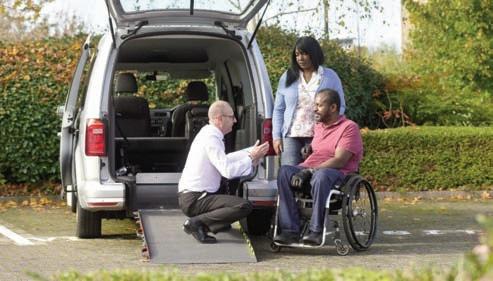
The next thing your WAV supplier supports you with is the routine servicing and maintenance of your vehicle.
As WAVs are converted from standard vehicles, you need to keep up with the manufacturer’s servicing schedule to keep the vehicle in good working order. Your supplier will make sure that your WAV is serviced and has its MOT test when it’s needed during your lease.
Remember
Your Motability Scheme lease package is allinclusive, which means that all servicing, maintenance, and breakdown assistance are covered.
On top of arranging the regular servicing for your vehicle, your WAV supplier will also carry out an annual WAV check for the conversion elements of your WAV.
This is carried out each year, usually at your home address, and will cover things like the ramp or lift and wheelchair tie-downs to make sure they’re working correctly and still meet your needs.
If the supplier sees something needs fixing, they’ll try to do it right away if they have the parts. If not, they’ll set up another time to fix it and will aim to complete these repairs.
For any mechanical issues outside of your annual WAV check, your WAV supplier should be your first point of contact.

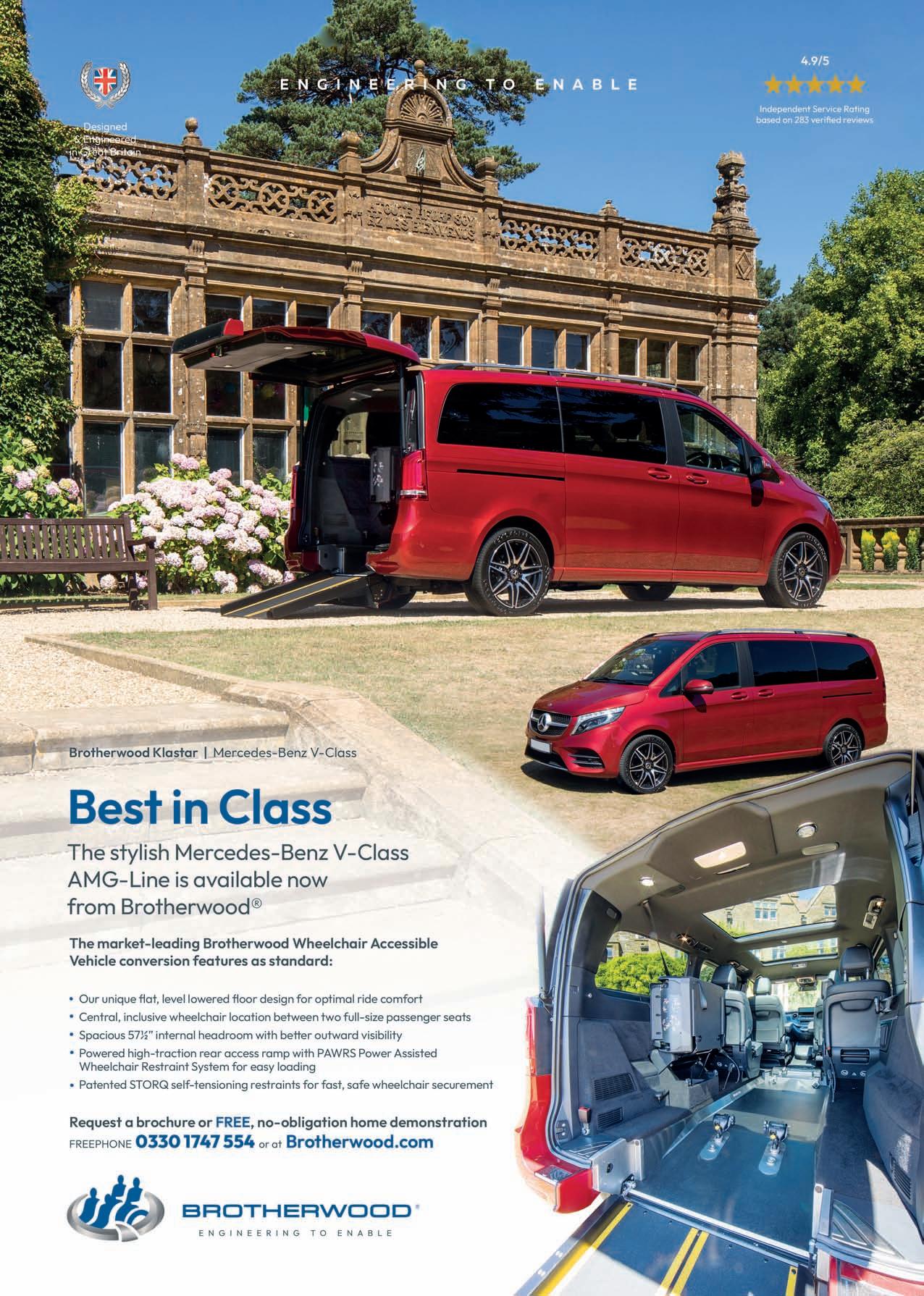
UK have teamed up to provide unpaid carers in England with a new specialist online resource dedicated to supporting them to activate their own rights as a carer.
To meet growing demand for free legal information, the awardwinning online solution, AccessAva, has been developed by Access Social Care to provide 24/7 independent legal support and guidance to people across England. It helps adults, families and carers who need health and social care support by offering legal information, guidance or a letter to help resolve social care problems (written and reviewed by lawyers), and prioritises a person-centred approach, takes the user through their situation and uses AI technology to learn from chatbot conversations.
carers’ rights including accessing a carer’s assessment, alternative support when care cannot be provided and ending a caring role.

Carers UK’s own research into carers’ assessments and support has found that the process is commonly poorly understood by carers and that it can fall short of delivering their rights set out in law. Carers UK’s State of Caring 2023 report found that only 18% of unpaid carers surveyed said they had an assessment at the point of hospital discharge even though they were providing substantial care. One third (33%) of unpaid carers who had received a carer’s assessment said that it did not properly consider their need to take regular breaks.
The new resource provides specific guidance on


Madeleine Starr MBE, Director of Carer Services at Carers UK said: “For unpaid carers who are already time poor, exhausted by caring, overwhelmed with administration and bewildered by complex care systems, they need every bit of help they can to get their basic entitlements to carers’ assessments and to support.
“Our advice services often hear from carers who have challenges with social care support. This resource helps us to reach and support many more carers than ever before.”






Kari Gerstheimer, Chief Executive of Access Social Care said: “We are working towards a future where social care is adequately funded, and we all get the support we need. We are really proud to be partnering with Carers UK, and we hope that, through this collaboration, many more carers will use AccessAva and get the support they are entitled to."
The 2021 Census shows that there are 4.7 million unpaid carers looking after disabled, older or ill relatives or friends in England, with over 400,000 providing over 50 hours of care per week. The support they provide is worth £152 billion a year, equivalent to a second NHS.3
AccessAva, can be accessed at: www.carersuk.org/help-andadvice/helpline-and-other-support/acce ss-social-care-for-advice-on-socialcare-issues-in-england

DANIEL FIDDES (13) has been taking part in judo classes at Hamilton Judo Club since he was just seven years old. As a recent bronze medalist in the British Schools VI Championships, Daniel is keen to let others know about his chosen sport.
“We had a session at school where people who ran the judo club came in and held a demonstration, and I really enjoyed it so I started taking classes.” says Daniel, who has nystagmus, a sight loss condition which causes repetitive and involuntary movement of the eyes. He is one of over 5,000 children in Scotland with vision impairment.
“I really enjoyed learning all the different movements and how to do them. It feels really natural to me. It’s now my favourite sport!”
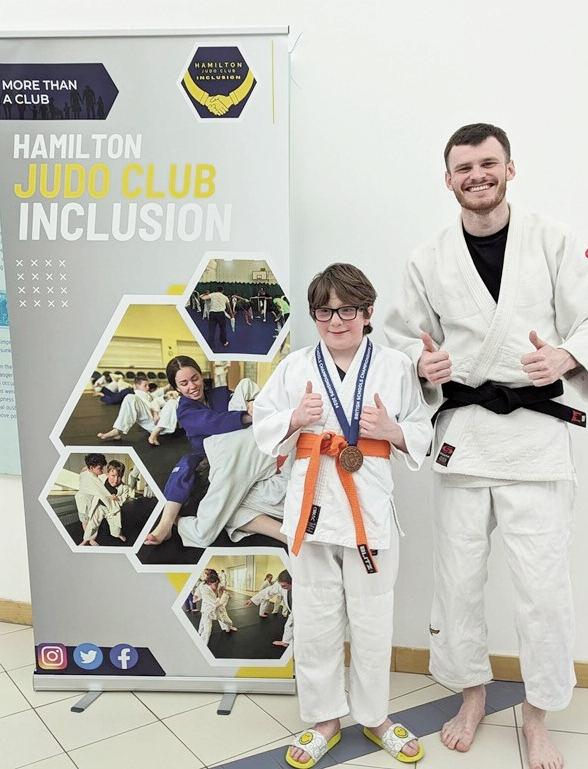
Sport and activities like judo can also be positive for young people’s mental and emotional wellbeing, as this year’s Mental Health Awareness Week highlighted in the theme of ‘Movement’.
“Every session I finish, I go away happy,” says Daniel. “If I have a school subject I don’t like, I know I’ve got judo every Wednesday and that helps me get through it! Judo is the best sport there is. My brother went to the dark side and he does taekwondo. But judo is better, obviously. It’s really fun and it’s quite active and physical.”
Daniel’s sight loss doesn’t stop him from competing, “I don’t know what full vision is like, but I feel that I can have some useful sight with my condition. I have sports goggles which I use instead of glasses in my class- because once my glasses fell off and got sat on!”
“One of my favourite memories of judo is when I was supposed to demonstrate holding someone down, and the teacher said, ‘Daniel, please refrain from holding him too well- he might there until this Christmas!’ because there was no way he was getting out of my hold!”
Outside of judo, Daniel is a keen video gamer and likes to draw and create artwork. He has also attended family fun days with sight loss charity, RNIB Scotland, and enjoys playing dodgeball with his Scouts group.
John Kane, from Hamilton Judo Club Inclusion and Director of Scottish Disability Sport says, “Judo is an ideal sport for those with visual impairment because you learn the feel of the grips which help you keep control when fighting. Other fighters can learn from people like Daniel, because he has more spatial awareness on the mat. It’s a sport for anyone and we’d love to get more people involved with judo.”
And what of Daniel’s future and fan base?
“I won the bronze medal this year, and the silver medal the year before, so I hope to keep competing in judo, and to keep getting better. I don’t say I have a fan base; I just say I have friends.”


Not many people know how to pronounce boccia (note: it rhymes with gotcha), yet it’s the fastest-growing disability sport in the world.
The Paralympic sport is a game of strategy, accuracy and tension.
And Britain’s home to some of the best boccia players in the world. This summer, Great Britain will vie for medals at the Paris Paralympic Games. Leading the squad is three-times gold medallist David Smith OBE and World Champion Claire Taggart.
H ow do you p la y bo c c i a ?
Players must throw, roll or kick coloured balls as close as possible to a white target ball, known as the “jack.” There are four classifications at the Paralympic Games – BC1, BC2, BC3 and BC4.
BC3 players are unable to throw or kick the ball so they use a ramp and a ramp operator.
Sally Kidson will make her Paralympic debut this summer. She has Spinal Muscular Atrophy type 2:
“Even those with a severe weakness as myself can compete in the BC3 class - all you need to do is be able to direct your assistant to line up the ramp and place the ball, release the ball, and - most importantly - think tactically and strategically.”
You can compete as an individual, in a pair or as a team. Each side has six balls (red or blue) each end to try and score points. Points are accumulated over the course of a match to find a winner.
T h e be n e fi t s o f b oc c i a
Playing boccia is hugely beneficial.
Scott McCowan retired from international competition after a hugely successful 16-year career which took him to three Paralympic Games. He has Duchenne’s Muscular Dystrophy and says:
“Often people think they can’t play a sport because of their disability. Sometimes there is a nervousness in case it worsens a condition. But really people should play as soon as possible. Boccia keeps me active and fit which is crucial for my quality of life.”
I s b oc c i a di ff i c u l t t o p la y?
It’s much harder than it looks. As skills improve, the tactics of the sport offer tension and excitement.
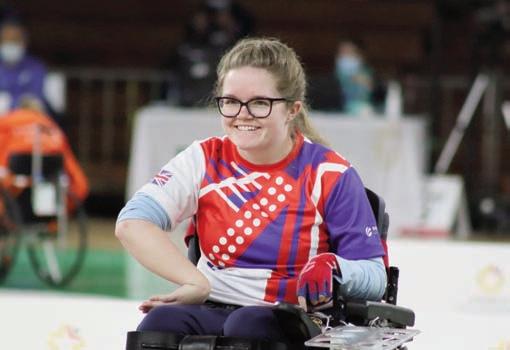
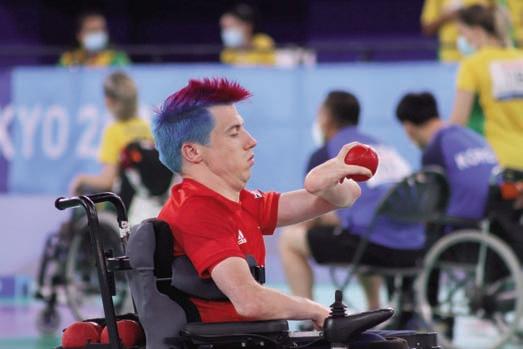
game. You have to plan ahead and outsmart your opponent.”
L o ok i ng fo r t h
Boccia UK is on the lookout for the next generation of Paralympians. We are looking for people who are competitive, creative problem solvers and good at strategy games. Physically, we are looking for people who are QUADRIPLEGIC, as a result of:

• IMPAIRED MUSCLE POWER

• IMPAIRED PASSIVE RANGE OF MOVEMENT

• LIMB DEFICIENCY

• HYPERTONIA

• ATAXIA

• ATHETOSIS
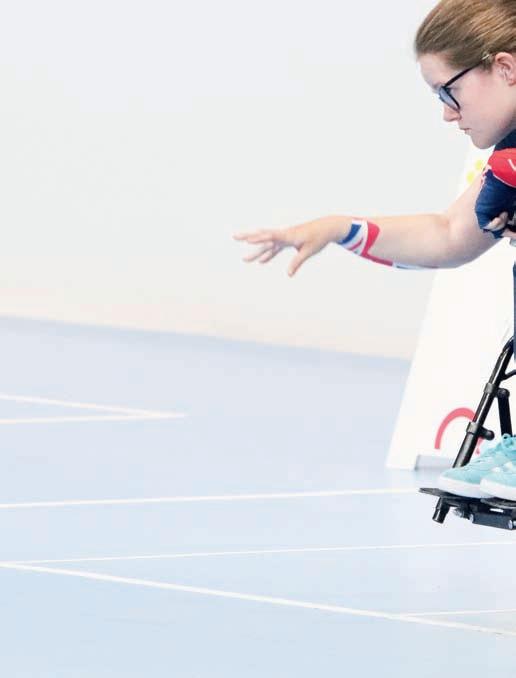




WarringtonDisability Partnership, the organisers of the UK’s and possibly, the worlds, largest voluntary led pan disability exhibition are finalising the plans for this year’s 33rd annual event that will be the finale of a week of seven complementary events.
Event founder and co-ordinator Dave Thompson MBE DL said, “We are very pleased to announce that disability education specialists Expanse Learning Group and the North West’s water supplier United Utilities, are leading our list of sponsors for DAD 2024”.
The aim of this year’s event is to promote independent living through the theme “It’s what disabled people can do that matters”. DAD 2024 exhibitors will highlight solutions supporting independent living and mobility, with equipment, products, transport, employment, education, training, health and social care, leisure activities, alongside over 100 charities/support groups.
Most of the exhibitors will be housed in a huge, tented village of marquees that will be supported by; an extended Sports Zone, a Main Arena, a huge Performing Arts Marquee, two further Arts Marquees for art and crafts, a Silent Disco, a children’s fun fair and play areas. Entertainment will also be available adjacent to the entrance bridge and Heritage Yard.
On the day, visitors can gain an insight into the help and









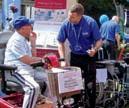






















support that is available locally, regionally and nationally from statutory organisations, businesses and voluntary sector groups.
They can “have a go” at sports activities including Tennis, American Football, Snooker, Rugby League, Martial Arts, Tai Chi and Scuba Diving in the on-site pool. In addition, Warrington Youth Zone’s giant sports inflatables.
For those looking for a more relaxed day we will have a fantastic line-up of talent in the Arts Marquee with some of the UK’s leading disabled artists. Alternatively, sit alongside the Main Arena watching Guide Dog display team, Reach Sled Dogs Display Team, Batida Rio Samba Band, Royal Marines Corps of Drums and sports demonstrations. Children can visit the funfair rides or Walton Gardens accessible onsite zoo, crazy golf, high ropes and pitch and putt.
Support services at DAD 2024 will include a free accessible Park and Ride service, free accessible buses from Warrington Town Centre, a free scooter and wheelchair loan service with trained enablers, British Sign Language interpreters, additional unisex wheelchair accessible toilets and over 100 trained stewards and helper’s eager to make it a day to remember for everyone.
The team involved in DAD Warrington have worked with teams from across the world, who organise events in Cameroon, Gibraltar, Egypt, Sudan, Thailand, Uganda and many more countries.


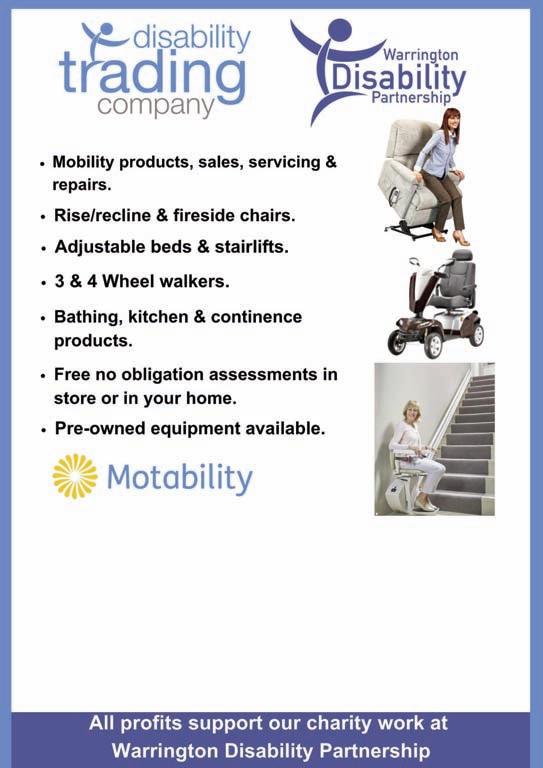
revamped facility has been christened ‘Judy's Groom Room’ – a tribute to Izzy's loyal companion.
The official ribbon-cutting ceremony included Izzy, along with Sarah Matthews, Area Manager from Pets at Home and Ada Wojtkowiak from the Hereford Pets at Home store. A small audience, including some of the guide dogs who will benefit from this space assembled to watch Izzy cut the red ribbon. Canine decorum held strong for a short while, but true to their nature, playful chaos soon erupted!

Driven by the desire for a more user-friendly space to bathe her guide dog (Judy), Izzy meticulously planned the refurbishment. Joining forces with her friend Sonal, Izzy liaised with RNC’s Estates team to decide on what was needed for the refurbishment while Sonal organised a charity hair chop to raise funds.
Sonal, along with staff members Lisa, Flea, Nina, and Jennifer, bravely volunteered for haircuts in exchange for donations (the hair was donated to the Little Princess Trust). Their efforts raised a fantastic £1,300 towards the project and a generous grant of £2,500 from Pets at Home’s charity, the Pets Foundation, ensured the project's completion.
The Estates team worked incredibly hard to fit out the washroom in between their regular duties. The newly
Beyond a shiny new bath with grooming arm and non-slip steps, the refurbishment boasts a grooming table, a convenient pet hair dryer, non-slip, easy-clean flooring, shelves, hooks and storage along with drying mitts, towels and everything that a guide dog about town might need.
Izzy, beaming with pride, said: ‘I’m thrilled with the refurbishment and would like to say a massive thank you to everyone who raised money through sponsored haircuts, to the Pets Foundation and to the RNC Estates Team who completed the refurbishment work. A lot of work has gone on behind the scenes to make my plans a reality. It’s turned out amazingly and Judy [guide dog] has already tried it out and is loving the new space for pampering.’
The Royal National College for the Blind is proud of Izzy's accomplishment and the positive impact ‘Judy's Groom Room’ will have on the College’s community of guide dogs.

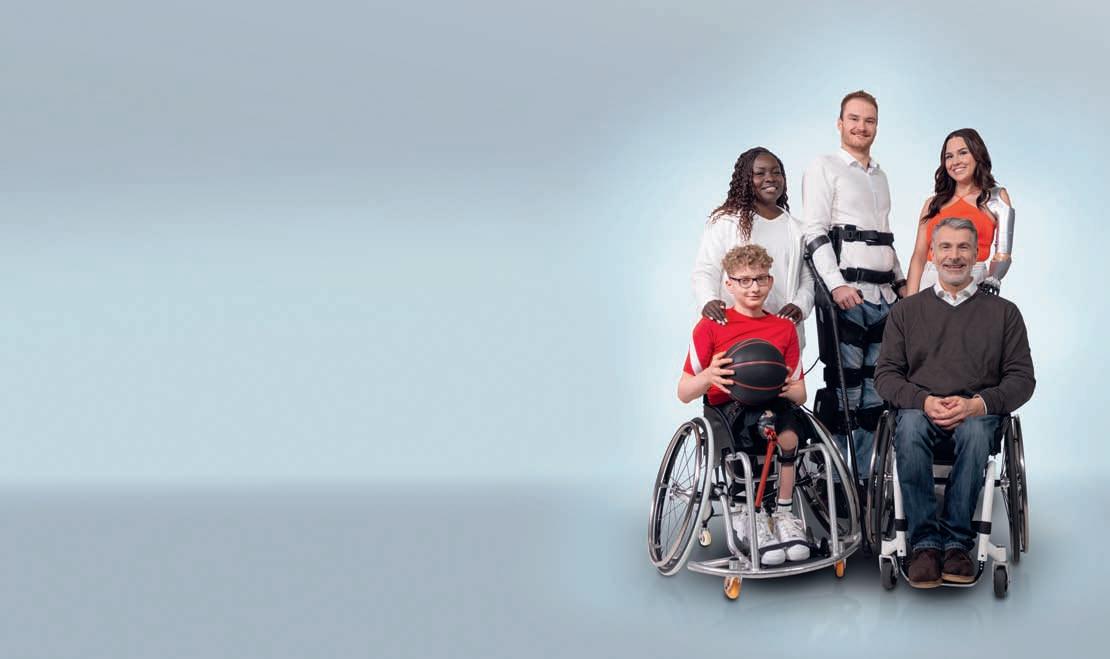
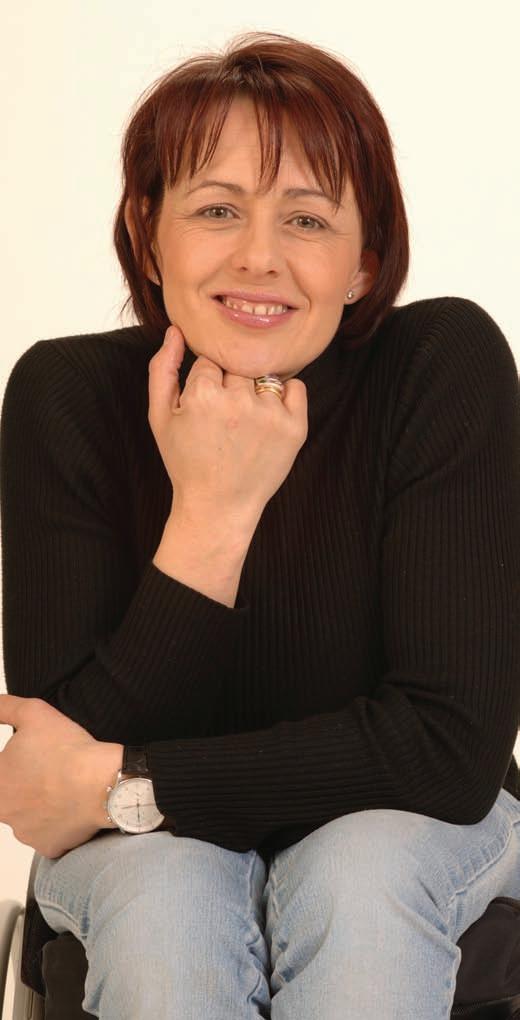
It doesn’t seem any length of time since I was talking about Tokyo Paralympic selection, and now we are weeks away from Paris. Trying to plan the Games around all the Covid restrictions seems a long time ago. It was an incredible shame for the athletes that they were not able to have any spectators in the venues so the expectations on Paris will be high. Everyone expected Tokyo to raise the bar, so all the expectation is going to be on Paris. For spectators (both who visit and those watching on TV) the time difference is going to make it much easier to watch in real time.
It has been a long time coming for Paris and they have had multiple attempts to bid for the Games. It was hard looking back to 2005 when London won the right. It was a magical moment
for the UK but tough to see a team that we had got to know be so disappointed. They, like London, are using the historical venues around the city. In London it was Horse Guards Parade that was the venue for the beach volleyball. This time it will be in the shadow of the Eiffel Tower.
The Palace of Versailles will host Equestrian events. In 2012 they were held in Greenwich Park. I am very excited about what the Games are going to be like and how the team is going to perform. This is the chance to move the Games to another level of recognition around the world. There are lots of opportunities for some great performances and hopefully GB winning medals. The British Team have a long history of performing well. In Tokyo they were the only team to win medals across so many sports.
Paris made big promises on accessibility, most
notably around the metro, and it was mentioned that it would change the city for the better for everyone. Until 2012 cities didn’t really think about legacy. Now, as we think about the environment and sustainability, access is going to play a bigger part. Sadly, the metro is not going to be any better. In the last few months, it has been announced that access is not going to have the improvements we expected. It is hard and expensive to do it, but it is equally disappointing that we thought it might be. I know from my experience of working in the UK that these things are not easy to change, but broken promises are even harder to deal with.
I haven’t been on the metro yet in Paris and I am not sure that I am going to try, now I know it is going to be so challenging. I have tried to use trains and that wasn’t easy. I was apparently meant to book assistance 48 hours in advance, which I got wrong, and I got to where I needed to be in the end, but it was pretty difficult. I am lucky in two ways. I am going to Paris this Summer, and I also have a battery pack attachment that moves me around quite quickly which I am going to be taking with me. I am trying to minimise the impact (like I do in the UK) of public transport on my ability to get around.
In terms of legacy, the International Paralympic Committee are becoming more involved and evolved in their thinking. From Tokyo they launched a campaign called We the 15, and talked about getting more disabled people into work, but across the world and with all the different legislation that was going to be a tough ask. It will be interesting to see the next iteration and how they can help. Apparently, there are better figures (small increases) and it is hard to attribute this to the Games alone. With each iteration of the Games there are going to be other attempts to try and change how disabled people are treated. We cannot rely on the four-year cycles of the summer and winter games to change how disabled people are able to be integrated into society.
The publicised review of welfare benefits has been halted due to the election, but this is not going to stop it completely. Whatever government comes into power, the system is going to have to be assessed and possibly restructured. While there is a lot to do in the UK on public transport, there is a lot to do across everything to do with disabled people. The Games are going to be brilliant, but we cannot forget how much more we still need to do.
The vehicle harnesses are designed to be worn in conjunction with the existing safety belts to provide additional postural support and/or to offer a certain degree of restraint when used for those passengers with behavioural problems or learning difficulties. Tel: 01253 852298 Email: info@crelling.com www.crelling.com
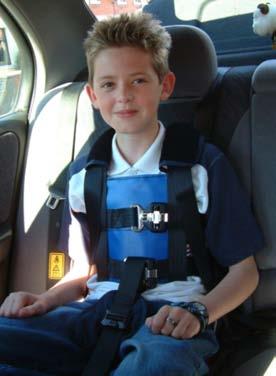
Crelling Harnesses manufacture a full range of special needs harnesses suitable for use on all kinds of equipment including wheelchairs, buggies, scooters, shower chairs, bathing equipment, stair lifts and seats in cars, buses and aircraft etc.

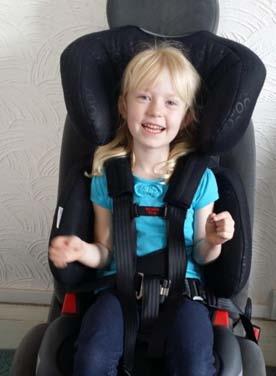
THE most recent Disability Price Tag study by Scope found that households with at least one disabled child or adult need an extra £975 a month to have the same living standards as a non-disabled person. That’s a daily charge of more than £32 and a total of £11,700 a year, just for being disabled.
Mike Adams OBE is a celebrated disability leader, CEO of the influential disability organisation Purple and founder of EnableAll, the online marketplace pushing for a new standard of web accessibility He outlines the costs associated with being disabled in the UK and the gaps that need to be addressed to make the cost of living more affordable for households.
W h e r e d o t h e s e a d d i t i o n a l c o s t s c o m e f r o m ?
The main costs associated with disabled households are the products required, particularly specialist equipment This isn’t just mobility aids, which are the commonly associated equipment with disabled people In fact, only 8% of disabled people are wheelchair users Instead, it can include anything from home adaptations like bed levers, to medication and therapies.
Costs also rise for disabled households when it comes to spending on everyday things, as extra considerations must be made to accommodate disabilities. When booking a holiday, for example, it could result in added costs due to accessible room availability, additional insurance premiums, or having to pay more for the delivery of household goods if you have limited mobility.
This also applies to the increased use of essential resources, such as energy or the need for more accessible transportation options that require more fuel. When combined with the cost-of-living crisis, it significantly affects the disabled community, which heavily relies on electronic support to lead their lives
I s h e l p o n t h e w a y ?
So, what considerations are being made for people with disabilities in the UK? The gover nment updated the Disability Living Allowance (DLA) in April, increasing it by 6 7% in line with inflation While the increase is a step in the right direction, it’s unlikely to close the long-term gap created by previous economic crises.
It’s not just financial considerations that aren’t being given the appropriate room for growth either, which Mike emphasises: “Social considerations also require work. Many non-disabled people may not appreciate the lengths that disabled people need to take to live an everyday life This is where the inspiration for EnableAll came from, as so few considerations have been made regarding everyday experiences, socially, financially and digitally ”
T h e g a p i n t h e r e t a i l i n d u s t r y
One industry that has significant gaps to address is retail. While the high street has taken some steps to make the shopping experience more inclusive and improved overall, there’s a significant area within online shopping and the experience of purchasing products and services over the inter net that retailers almost completely disregard
Whether it’s websites not being built to allow for keyboard navigation or an overwhelming amount of popups that can be anxiety-inducing for people on the neurodiverse spectrum or with mental health issues, it can make using sites extremely off-putting This leaves an entire market of people completely underserved, and we estimate that retailers in the UK are missing out on their share of the Purple Pound We’ve estimated that this can be as much as £274 billion annually, and that amount is only increasing
Mike has also gone into detail on considering why digital accessibility is so crucial: “It's easy to consider just the financial implications, but not giving disabled people the freedom to complete tasks that millions of others can do easily can have a huge impact on wider wellbeing and make disabled people feel disconnected from society This is why EnableAll exists to push the boundaries of accessibility standards, conforming to AAA WCAG 2.2 standards to ensure that it can be the online marketplace that truly is for all.”
At EnableAll, we’ve built a marketplace that not only adheres to the highest levels of digital accessibility but also pushes those boundaries and sets new standards. We want all shoppers who visit the site to have fantastic online shopping experiences and feel the freedom to do it themselves
For more information on how to sign up as a retailer and unlock the millions of underserved online shoppers, visit www.enableall.com/uk and get in touch today.

ITIS an unacceptable truth that some autistic people and people with a learning disability live in settings far more secure than their needs require. Despite multiple commitments to resolve this over many years, yet another government deadline to resolve the problem passed in March 2024.
Almost ten years ago, the NHS published its first strategy to reduce the number of people in Assessment and Treatment Units (ATUs). Subsequent deadlines to cut the numbers of autistic people and people with a learning disability living as inpatients in mental health ATUs have been missed The latest target was to reduce the 2,905 people detained in such settings in 2015 by a half by March 2024
Recently published figures show the reduction was instead just under 30%, with 2,045 people still living in ATUs at the end of March Of these 2,045 people, 1,380 (67%) are autistic This denotes a 116% increase in the number of autistic people without a learning disability detained since March 2015.
Nobody who has followed this story will be remotely surprised, which makes the need for urgent action even more pressing
In 2011 BBC’s Panorama exposed distressing abuse of patients by staff at Winterbourne View, a privately owned ATU This prompted widespread condemnation, and a realisation that thousands of people were stuck needlessly in ATUs
Several months after the Panorama documentary, the government instructed the Care Quality Commission (CQC) to inspect 150 hospitals and care homes. This uncovered wide-ranging poor practice
In December 2012 the government published Transforming Care: A National Response to Winterbourne View Hospital. The report pledged that people with a learning disability and people with autism living in ATUs would be moved to community-based care no later than 1 June 2014.
In 2015, NHS England, the Local Government Association (LGA) and the Association of Directors of Adult Social Services (ADASS) published Building the Right Support – guidance supporting commissioners to reduce the number of people with a learning disability and autistic people in ATUs and seeking to develop community alternatives
The 2019 NHS Long-Term Plan updated the target to halving numbers by March 2024 That target has now been missed too
New NHS priorities for 2024/25 include reducing reliance on mental health inpatient care for people with a learning disability and autistic people Given the history of failure, it is reasonable to question whether this aspiration will be achieved.
Throughout this thirteen-year period there has been no shortage of reports, papers, articles, service models and
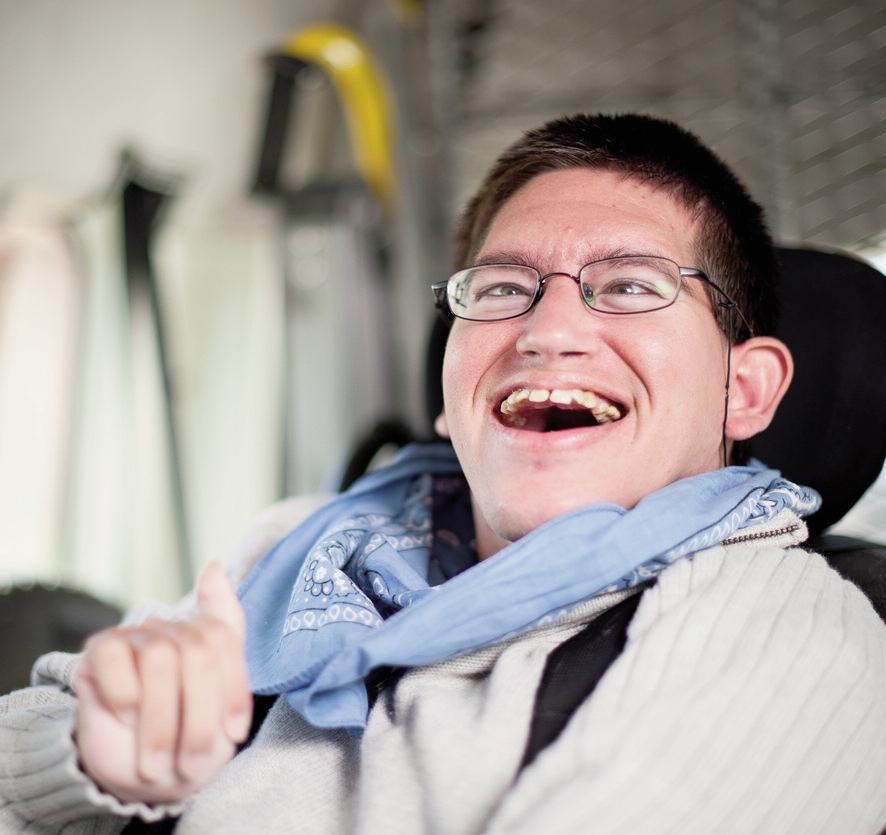
specifications published These propose evidenced solutions, and often say much the same thing There is not a lack of ideas about what to do. VODG has been engaged in demonstrating the practical solutions that third sector providers can offer
Perhaps the most striking feature of all this is that almost everyone concurs. There is no need to campaign to change the Government’s mind because the Government agrees So does NHS England, CQC, most provider and membership organisations, and all user-lead organisations
National commissioning guidelines for integrated care boards (ICBs) state that an in-patient stay “should be for the minimum time possible, for assessment and/or treatment which can only be provided in hospital”.
Achieving this depends on a vibrant care and support market that can work with people when they leave hospital –or prevent them being admitted in the first place
There is an urgent need to build social care provider capability and capacity to deliver community-based services for people needing complex support Good commissioning should invest to save over the longer term – resourcing prevention by partnering with community providers and housing suppliers
A significant stumbling block to the development of community-based provision is the availability of suitable housing Much can be achieved when NHS and local authority commissioners work in partnership with third sector providers on capital investment programmes that enable the right kinds of accommodation to be secured.
We see little evidence that ICBs have strategic plans to avoid admission and enable discharge Some providers have been able to develop effective community-based services that provide an alternative to inpatient provision, but demand for such support outstrips supply
In 2019 VODG said that the time had gone for further reviews. That assertion holds. This is now a time to act – to act differently and to invest differently
There are more than 2,000 British citizens detained in NHS-funded accommodation, against their wishes and against the wishes of their families. Often for years, and with no clear release date
This is a national scandal that should become a national priority We need a Government willing to act, not just agree
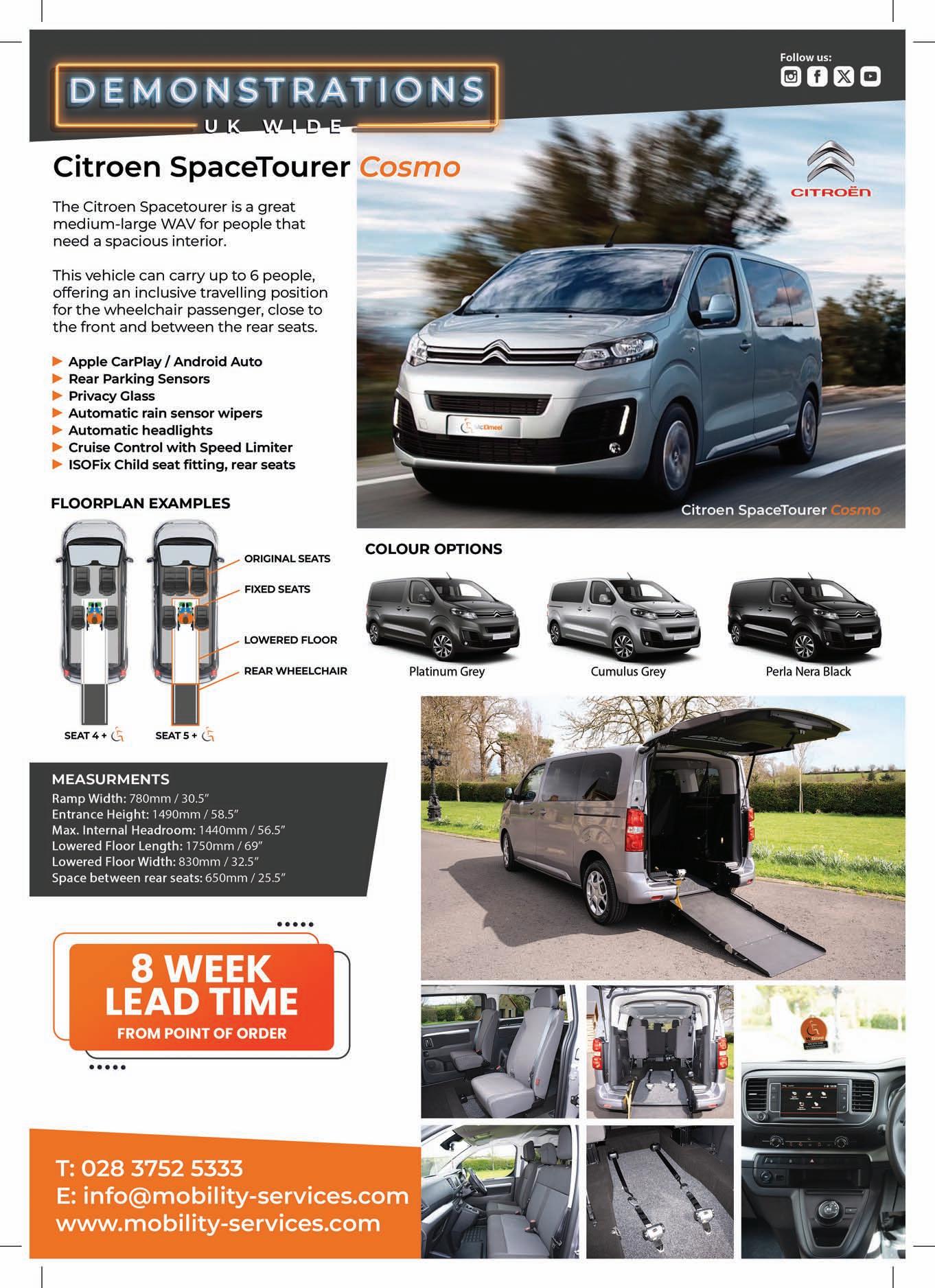


THERE is much in the modern world which fills me with an equal measure of consternation and incredulity. Luckily, I seem to have been born with a sense of humour. I think my good fortune was born from an idyllic, happy childhood. Put another way, and to use one of my mothers regular quotes, “I blame the parents”! As I recall, she was usually referring to naughty boys such as those mods and rockers in the early 1960s, but it serves me well to reverse her logic.
Over the decades, my optimistic, cheerful outlook has helped me cope with a multitude of challenges and episodes that might have troubled the less fortunate.
Now before I continue, I do recognise that some events and issues in life are not funny, but treating them with polite gentle disdain, a giggle or a knowing shake of the head, is the preferable solution. Boris Johnson is one example of such an issue, and can anyone explain why a Magnolia tree bursts into glorious bloom, at the very moment that our capricious spring delivers sprightly winds to send the beautiful blossom into next door`s garden?

I often think back to a lovely chap called Charlie who lived in Parkstone near Bournemouth. Back in the day, Charlie purchased a powered wheelchair from me after he had endured an uplifting couple of hours of my extolling the features and benefits of these new wheels. He was a fellow with a similar outlook on life to mine and, despite suffering severe aftereffects of a stroke, he was
determined to maintain his mobility and independence.
Some months after this, I was in his neighbourhood again and decided to pop in and say hello. He was, as expected, full of good cheer and bonhomie and shared a short, amusing account of a recent incident.
There had been some rather nasty weather in the Bournemouth area, the type of torrential rain usually reserved exclusively for Bank Holiday Mondays. As a result, Charlie found that his usual route to the corner shop had become somewhat hazardous. He needed to cross a main road via a subway. Being a fellow of a positive nature, when discovering that the subway was flooded, he decided that the water could only be an inch or two deep and hence would not be a cause for concern.
It transpired that his estimation was, as he related “less than accurate”. Halfway through the flood, his wheelchair spluttered to a halt, and he found himself stuck with water up to his waist.
Some kindly passers-by attempted to help but only succeeded in spoiling their shoes and the bottom half of their trousers, leaving Charlie stranded. The fire brigade was summoned and in no time Charlie and his wheelchair had been lifted to safety.
Now comes the punch line of this tale; One of the burly young firemen asked if he was ok and wanted to make sure that they had not left any valuables down in the flood. Charlie`s instant retort was a minor classic; “I am a bit worried about my dog”. The
Eddie Peacock has worked in the mobility industry for “rather a long time”. He enjoyed a challenging career having started by selling wheelchairs, scooters and stairlifts for Sunrise Medical, eventually working his way to the position of UK sales manager. After a period as a self-employed consultant he was invited to manage movingpeople.net, then Handicare Ltd, in
')((-+#.%2+.%&+%+-%,&(# Q-(#%7&+.04%=2''#$'S;4%2,,#(=,#.%,-%"#0=%;),
%2+.%"&'%/"##0*"2&$%"2.%;##+%0&1,#.%
')((-+#.%2+.%&+%+-%,&(#%O"2$0&# ;4%2,,#(=,#.%,-%"#0=%;),-+04%')**##.#.%&+%'=-&0 %-1%,"#&$%,$-)'#$'8%0#2:&+<%O"2$0&#%',$2+.#.
-+04%')**##.#.%&+%'=-&0&+<%,"#&$%'"-#'% %',$2+.#.5%!"#%1&$#%;$&<2.#%/2' "2.%;##+%0&1,#.%,-%'21#,45% &+<%,"#&$%'"-#'% /2'




stunned fireman was instantly about to rush back to find Bonzo until Charlie re-assured him that he didn`t own a dog.
9,%,$2+'=&$#.%,"2,%"&'%#',&(2,&-+%/2'8%2'%"#%$#02,#.%?0#''%,"2+%2**)$2,#@5%P201/24%,"$-)<"% ,"#%10--.8%"&'%/"##0*"2&$%'=0),,#$#.%,-%2%"20,8%2+.%"#%1-)+.%"&('#01%',)*7%/&,"%/2,#$%)=% Q-(#%7&+.04%=2''#$'S;4%2,,#(=,#.%,-%"#0=%;),%-+04%')**##.#.%&+%'=-&0&+<%,"#&$%'"-#'% 2+.%,"#%;-,,-(%"201%-1%,"#&$%,$-)'#$'8%0#2:&+<%O"2$0&#%',$2+.#.5%!"#%1&$#%;$&<2.#%/2'% ')((-+#.%2+.%&+%+-%,&(#%O"2$0&#%2+.%"&'%/"##0*"2&$%"2.%;##+%0&1,#.%,-%'21#,45%%
I walked around the corner, and someone saw me grin.
When he smiled, I realised I had passed it on to him.
I thought about the smile, and then realised it`s worth.
A single smile like mine could travel round the earth.
So if you feel a smile begin, don’t leave it undetected.
-7%2+.%/2+,#.%,-%(27#%')$#%,"2,% O"2$0&#M'%&+',2+,%$#,-$,%/2'%2%(&+-$%*02''&*T%?9%2(% %*-(#'%,"#%=)+*"%0&+#%-1%,"&'%,20# /2+,#.%,-%(27#%')$#%,"2,%, %*-(#'%,"#%=)+*"%0&+#%-1%,"&'%,20#T%G+#%-1%,"#%;)$04%4-)+<% ,"#4%"2.%+-,%0#1,%2+4%:20)2;0#'%.-/+%&+%,"#%10--.5% M'%&+',2+,%$#,-$,%/2'%2%(&+-$%*02''&*T%?9%2(%2%;&,%/-$$&#.%2;-),% ;)$04%4-)+<%1&$#(#+%2'7#.%&1%"#%/2'% %"2.%+-,%0#1,%2+4%:20)2;0#'%.-/+%&+%,"#%10--.5% /-$$&#.%2;-),%(4%.-<@5%!"#% 1&$#(#+%2'7#.%&1%"#%/2'% 5%!"#%
This story has remained in my brain for a few years now and is testament to his state of mind, agile brain, and sense of humour.
M'%&+',2+,%$#,-$,%/2'%2%(&+-$%*02''&*T%?9%2(% 1&$#(2+%/2'%&+',2+,04%2;-),%,-%$)'"%;2*7%,-%1&+.% "&(%,"2,%"#%.&.+M,%-/+%2%.-<5
Start an epidemic and get the world infected.
H-/%*-(#'%,"#%=)+*"%0&+#%-1%,"&'%,20#T%G+#%-1%,"#%;)$04%4-)+<%1&$#(#+%2'7#.%&1%"#%/2'% -7%2+.%/2+,#.%,-%(27#%')$#%,"2,%,"#4%"2.%+-,%0#1,%2+4%:20)2;0#'%.-/+%&+%,"#%10--.5% O"2$0&#M'%&+',2+,%$#,-$,%/2'%2%(&+-$%*02''&*T%?9%2(%2%;&,%/-$$&#.%2;-),%(4%.-<@5%!"#% ',)++#.%1&$#(2+%/2'%&+',2+,04%2;-),%,-%$)'"%;2*7%,-%1&+.%I-+R-%)+,&0%O"2$0&#%$#S2'')$#.% "&(%,"2,%"#%.&.+M,%-/+%2%.-<5%
',-$4%"2'%$#(2&+#.%&+%(4%;$2&+% (&+.8%2<&0#%;$2&+8%2+.%'#+'#%-1%")(-)$5
9+%,"#%(-;&0&,4%&+.)',$4%
In the mobility industry we regularly meet plenty of people who have been dealt one of life`s short straws. Accidents and illnesses show no prejudice. They can strike any of us at any time and the effects can be devastating. Coping with such traumas is a personal matter but a small step towards peace of mind can begin with the simplest of actions.
V-)%(24%/#00%7+-/%'-(#-+#%/"-%"2'%"#20,"%=$-;0#('8%#&,"#$%="4'&*20%-$%#(-,&-+208% 2+.%4-)%(24%/#00%;#%"#0=&+<%,"#(%,"$-)<"%2+4%:2$&#,4%-1%*"200#+<#'5%B%$#<)02$%'(&0#% /&00%<-%2%0-+<%/24%,-%(2&+,2&+&+<%2%=-'&,&:#%2+.%*-+',$)*,&:#%$-),#%,-%,"#%1),)$#5%
9+%,"#%(-;&0&,4%&+.)',$4%/#%$#<)02$04%(##,%=0#+,4%-1 $,%',$2/'5%B**&.#+,'%2+.%&00+#'' /2'%&+',2+,04%2;-),%,-%$)'"%;2*7%,-%1&+.%I-+R-%)+,&0%O
%&+%(4%;$2&+%1-$%2%1#/%4#2$'%+-/%2+.%&'%,#',2(#+,%,-% '#+'#%-1%")(-)$5
You may well know someone who has health problems, either physical or emotional, and you may well be helping them through any variety of challenges. A regular smile will go a long way to maintaining a positive and constructive route to the future.
!"&'%',-$4%"2'%$#(2&+#.%&+%(4%;$2&+%1-$%2%1#/%4#2$'%+-/%2+.%&'%,#',2(#+,%,-%"&'%',2,#%-1% (&+.8%2<&0#%;$2&+8%2+.%'#+'#%-1%")(-)$5%
I found this short ditty from one of my personal favourite comedians, Spike Milligan. Spike had a few health issues of his own, but he also had a razorsharp sense of humour. I find this short poem inspirational despite its simplistic form.
%=#-=0#%/"-%"2:#%;##+%.#20,%-+#%-1% %'"-/%+-%=$#U).&*#5%!"#4%*2+%',$&7#%2+4%-1%)'% 2'')$#.% "&'%',2,#%-1%
2+.%&'%,#',2(#+,%,-%"&'%',2,#%-1%
B**&.#+,'%2+.%&00+#''#'%'"-/%+-%=$#U).&*# I-+R-%)+,&0%O"2$0&# $#S2'')$#.%
%/"-%"2:#%;##+%.#20,%-+#%-1% 5%!"#4%*2+%',$&7#%2+4%-1%)'%
Smiling is infectious, you catch it like the flu. When someone smiled at me today, I started smiling too.

B,%2%=$2*,&*20%0#:#08%, 2%=-'&,&:#%2+.%*-+',$)*,&:#%$-),#%,-%,"#%1),)$#5
9%1&+.%,"&'%'"-$,%=-#(%&+'=&$2,&-+20%.#'=&,#%&,'%'&(=0&',&*%1-$(5 2,%2+4%,&(#%2+.%,"#%#11#*,'%*2+%;#%.#:2',2,&+<5 ;),%2%'(200%',#=%,-/2$.'%=#2*#%-1%(&+.%*2+%;#<&+%/&,"%,"#%'&(=0#',%-1%2*,&-+'5 Q=&7#%"2.%2%1#/%"#20,"%&'')#'%-1%"&'%-/+ '0-.'+1,+2'#,'$#3*',2*')$. "#20,"%&'')#'%-1%"&'%-/+8%;),%"#%20'-%"2.%2% -.'+1,+2'#,'$#3*',2*')$.4
the UK. In recent years he held the post of Marketing Manager for Mobility which also involved supporting and working with the BHTA.
9+%,"#%(-;&0&,4%&+.)',$4%/#%$#<)02$04%(##,%=0#+,4%-1%=#-=0#%/"-%"2:#%;##+%.#20,%-+#%-1% 0&1#M'%'"-$,%',$2/'5%B**&.#+,'%2+.%&00+#''#'%'"-/%+-%=$#U).&*#5%!"#4%*2+%',$&7#%2+4%-1%)'% 2,%2+4%,&(#%2+.%,"#%#11#*,'%*2+%;#%.#:2',2,&+<5%O-=&+<%/&,"%')*"%,$2)(2'%&'%2%=#$'-+20% (2,,#$%;),%2%'(200%',#=%,-/2$.'%=#2*#%-1%(&+.%*2+%;#<&+%/&,"%,"#%'&(=0#',%-1%2*,&-+'5% 9%1-)+.%,"&'%'"-$,%.&,,4%1$-(%-+#%-1%(4%=#$'-+20%12:-)$&,#%*-(#.&2+'8%Q=&7#%L&00&<2+5% Q=&7#%"2.%2%1#/%"#20,"%&'')#'%-1%"&'%-/+8%;),%"#%20'-%"2.%2%$2R-$S'"2$=%'#+'#%-1%")(-)$5% 9%1&+.%,"&'%'"-$,%=-#(%&+'=&$2,&-+20%.#'=&,#%&,'%'&(=0&',&*%1-$(5% !"#$#%&'#('#%)*+,#-.(/'0-.'+1,+2'#,'$#3*',2*')$.4' 52*%'(-"*-%*'("#$*6'1,'"*',-610/'7'(,18,*6'("#$#%&',--4' 7'91$3*6'18-.%6',2*'+-8%*8/'1%6'(-"*-%*'(19'"*'&8#%4'
He has now retired and is looking forward to finding the time to perform useful tasks in the industry, playing drums in a blues band, travelling and most important, being silly with his grandchildren.
%O-=&+<%/&,"%')*"%,$2)(2'%&'%2%=#$'-+20% $2R-$S'"2$=%'#+'#%-1%")(-)$5 %O-=&+<%/&,"%')*"%,$2)(2'%&'%2%=#$'-+20% ")(-)$5 52*%'(-"*-%*'("#$*6'1,'"*',-610
7'91$3*6'18-.%6',2*'+-8%*8/'1%6'(-"*-%*'(19'"*'&8#% 2-.&2,'1;-.,',2*'("#$*/'1%6',2*%'8*1$# '7'8*1$#(*6'7'216':1((*6 ='(#%&$*'("#$*'$#3*'"#%*'+-.$6',81>*$'8-.%6',2*'*18,2 /'7'(,18,*6'("#$#%&',--4 7'91$3*6'18-.%6',2*'+-8%*8/'1%6'(-"*-%*'(19'"*'&8#%4
*6'7'216':1((*6'#,'-%',-'2#"4 ,2-.&2,'1;-.,',2*'("#$*/'1%6',2*%'8*1$#(*6'#,<('9-8,24 '+-.$6',81>*$'8-.%6',2*'*18,24
52*%'2*'("#$*6/'7'8*1$#(*6'7'216':1((*6'#,'-%',-'2#"4' 7',2-.&2,'1;-.,',2*'("#$*/'1%6',2*%'8*1$#(*6'#,<('9-8,24' ='(#%&$*'("#$*'$#3*'"#%*'+-.$6',81>*$'8-.%6',2*'*18,24' ,"#%10--.8%"&'%/"##0*"2&$%'=0),,#$#.%,-%2% /2'8%2'%"#%$#02,#.%?0#''%,"2+%2**)$2,#@5%P201/24%,"$-)<"% ,"#%10--.8%"&'%/"##0*"2&$%'=0),,#$#.%,-%2%"20,8%2+.%"#%1-)+.%"&('#01%',)*7%/%2+.%"#%1-)+.%"&('#01%',)*7%/&,"%/2,#$%/2,#$%)=%
B,%2%=$2*,&*20%0#:#08%,"#$#%2$#%2+4%+)(;#$%-1%'#$:&*#'%2+.%'=#*&20&',%#3)&=(#+,%')==0&#$'% 2:2&02;0#%,-%-11#$%'-0),&-+'%,-%(-',%=$-;0#('5%P#$#%2,%!0%&%1-"2''3# 7+-/0#.<#%-1%,"#%(-;&0&,4%&+.)',$4%2+.%=0#+,&1)0%*-+,2*,'%/&,"%2<#+*&#'%/"-%*2+%"#0=% /&,"%U)',%2;-),%2+4%=$-;0#(5%91%4-)8%-$%2%0-:#.%-+#8%"2'%+##.%-1%"#0=%-$%2.:&*#8%=0#2'#% *-+,2*,%)'5%%
At a practical level, there are any number of services and specialist equipment suppliers available to offer solutions to most problems. Here at A b i l i t y N e e d s , we have immense knowledge of the mobility industry and plentiful contacts with agencies who can help with just about any problem. If you, or a loved one, has need of help or advice, please contact us.
"#$#%2$#%2+4%+)(;#$%-1%'#$:&*#'%2+.%'=#*&20&',%#3)&=(#+,% 2:2&02;0#%,-%-11#$%'-0),&-+'%,-%(-',%=$-;0#('5%P 7+-/0#.<#%-1%,"#%(-;&0&,4%&+.)',$4%2+.%=0#+,&1)0%*-+,2*, /&,"%U)',%2;-), *-+,2*,%)'5%
6-+#0&+#''8%1-$%#K2(=0# '#$&-)'%"#20,"%&'')#%2+.% ,-%-11#$%'-0),&-+'%,-%(-',%=$-;0#('5%P 91%4-) +#%-1%,"#%<$#2,%;#+#1&,'%-1%$#*#+,%,#*"+-0-<4%&'%,"2,%+-;-.4%+##.'%,-%;#%&'-02,#. +#''8%1-$%#K2(=0#8%211#*,'%")<#%+)(;#$'%-1%-0.#$%2+.%0#''%2;0#%=#-=0#5% '#$&-)'%"#20,"%&'')#%2+.%2%="-+#%*200%-$ ,-%-11#$%'-0),&-+'%,-%(-',%=$-;0#('5%P#$#%2,%!0%&%1-" 91%4-)8 -$%2%0-:#.%-+#8%"2'%+##.%-1%"#0=%-$%2.:&*#8%=0#2'#% 8%211#*,'%")<#%+)(;#$'%-1%-0.#$%2+.%0#''%2;0#%=#-=0#5% 2%="-+#%*200%-$8%&1%4-)%"2:#%,"#%,#*"+-0-<4 %/&,"%2<#+*&#'%/"-%*2+%"#0=% %+##.%-1%"#0=%-$%2.:&*#8%=0#2'#% %&1%4-)%"2:#%,"#%,#*"+-0-<48%2%:&.#-%0&+7%*2+% (27#%200%,"#%.&11#$#+*#5%I#',%-1%2008% 2%0&,,0#%',$'(&0#'%/&00%(27#%200%,"#%.&11#$#+*#5% 2%0&,,0#%',$-+<#$X8%*2+%;#%*$)*&205%Y" 2%'"-$,%:&'&,8%2%*"2,8%2%*)=%-1%,#2% Y"2,#:#$%/#%,$48%2%'#+'#%-1%")(-)$8%2%'#+'#%-1%")(-)$%2+.%-+#%-1%-)$%;#',% 2:#%1)+%-),%,"#$#Z55
G+#%-1%,"#%<$#2,%;#+#1&,'%-1%$#*#+,%,#*"+-0-<4%&'%,"2,%+-;-.4%+##.'%,-%;#%&'-02,#.5% 6-+#0&+#''8%1-$%#K2(=0#8%211#*,'%")<#%+)(;#$'%-1%-0.#$%2+.%0#''%2;0#%=#-=0#5%9,%&'%2% '#$&-)'%"#20,"%&'')#%2+.%2%="-+#%*200%-$8%&1%4-)%"2:#%,"#%,#*"+-0-<48%2%:&.#-%0&+7%*2+% (27#%200%,"#%.&11#$#+*#5%I#',%-1%2008%2%'"-$,%:&'&,8%2%*"2,8%2%*)=%-1%,#2%W-$%(24;#%'-(#,"&+<% 2%0&,,0#%',$-+<#$X8%*2+%;#%*$)*&205%Y"2,#:#$%/#%,$48%2%'#+'#%-1%")(-)$%2+.%-+#%-1%-)$%;#',% '(&0#'%/&00%(27#%200%,"#%.&11#$#+*#5%L-',%-1%200%"2:#%1)+%-),%,"#$#Z55% V-)%(24%/#00%7+-/%'-(#-+#% (24%/#00%;#%"#0=&+<%,"#(%,"$-)<"%2+4%:2$&#,4%-1%*"200#+<#'5% /"-%"2'%"#20,"%=$-;0#('8%#&,"#$%="4'&* /&00%<-%2%0-+<%/24%,-%(2&+,2&+&+<%
One of the great benefits of recent technology is that nobody needs to be isolated. Loneliness, for example, affects huge numbers of older and less able people. It is a serious health issue and a phone call or, if you have the technology, a video link can make all the difference. Best of all, a short visit, a chat, a cup of tea (or maybe something a little stronger), can be crucial. Whatever we try, a sense of humour and one of our best smiles will make all the difference. Most of all have fun out there…..
To contact Eddie send an email to abilityneeds@btinternet.com. or write to him at Ability Needs, 7 Montgomerie Terrace, Ayr, KA7 1JL
Earlier this year, we invited our communities to take part in the biggest survey we’ve ever run, asking what experiences and attitudes they’ve faced by the general public in the past year. More than two thirds (67%) of our communities say they have experienced negative attitudes or behaviours, and almost half (48%) have experienced this from their own family members.
47% of survey participants with hearing loss said members of the public have shouted or talked loudly at them in the last year, and 50% report people being impatient with them.
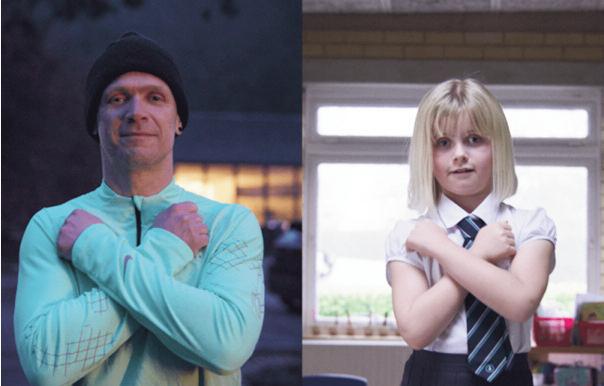
Cuttingly, over half of our participants (54%) reported regularly being excluded from conversations, with people saying ‘it doesn’t matter’ when they struggle to understand what is being said.
One participant with hearing loss said: “One of the worst things is when people say something I miss and when asked to repeat they say ‘oh it doesn’t matter’ It probably didn’t matter to them at the time, but it makes me feel I don’t matter.”
One in five (22%) of people with hearing loss said most people ignore them in public settings, and this increased to 41% for deaf people and 59% for people who use BSL.
One deaf woman surveyed by us said: “People tend to spot the hearing aids and then change, and will either start shouting or ignore me and talk to my partner ”
As well as family situations, shopping and the workplace were also highlighted as causes of stress for our survey participants. 51% of people with hearing loss have experienced negative attitudes and behaviours from retail staff in the last 12 months, which rises to 69% of deaf people and 81% of BSL users
A quarter (25%) of deaf people said they have experienced negative attitudes and behaviours from work colleagues in the last 12 months, a figure which is almost double (49%) for BSL users
The impact of negative attitudes and behaviours in daily life is colossal: of those who have experienced them, almost one in two (47%) told us
they feel excluded, a third (33%) feel lonely or isolated, and 39% said these experiences had a negative effect on their confidence For BSL users, the impact is often more significant, with 56% saying they feel disrespected by people around them
Crystal Rolfe, Director of Strategy at RNID, said: “1 in 5 adults in the UK are deaf or have hearing loss, yet our research shows that every day people face negative attitudes and behaviours at work, when they’re out shopping, and even from their families
“The impact of this can be huge: making people feel excluded, lonely, and disrespected, and destroying their confidence Often it causes people to withdraw, to avoid others, and even hide that they are deaf or have hearing loss
“We want people across the UK to stand with us and say that the way deaf people and people with hearing loss are treated really does matter. We know the public want to know how to do this, so we’re urging people to explore our easy tips on good communication ”
An enormous thank you to everyone who took part in our Big Survey earlier this year. Thanks to your contributions, we have the evidence to demand for better and help the general public understand the impact of their behaviour and misconceptions
It has also helped us create recommendations for the general public that will most make a difference Our set of communication tools and tips can help them communicate more inclusively, inviting everyone into the conversation and can be found by following the link at: www.r nid.org.uk/it-does-matter
To read a copy of our ‘It does matter’ report, offering in-depth insight into the negative attitudes and experiences faced by deaf people and people with hearing loss go to: www.rnid.org.uk/wp-content/uploads/2024/04/RNID-It-Does-Matter-Report-V2.pdf
ies in rory st e been man ve essful tco a suc en led ty OWIETwn as noly k popular ” ” o the e ison t omparycvide
irx g ears about Esse t yenecies in r he only wT“ies elevision ser essful t evw, ho ies does not his serT. OWIE xploits of one ersyaSusan S
, Susan is truly a ooprT Topr t or us aF en. vomheatfrifg edoubtable lady using his rT one of our highheir T. y is ahe only w ,err, ev ersn and , bor en. yqualit one evilsahohwdna,xessEniderb
aortrx, a truly e and is still living ,de
der ticular or , in no par Susan is , a chor err, it , a wr err, xploran e image which r r etime pilg tale is of a liffetime tion. She has su minaere and det , wheelchair bound or a time , fo asesultwr
tion of entto the a Susan came t
tion of e
on, a poet dained deac , an or , a motherr, r r, out pilg , and most of all a dev err, eals her amazing faith, c ev oke and as a , a str err, ed canc er er .
ntto the a om her chur alk fr or) on a wtollaain erT Ter lbans in Her
tion of ooprT Topr y using her b os AlympO
t Aal of Sthedrao oes is appr een these plac as a more w or Susan the distanc F oken pa,br, slopes t hillsouncac t allyaawth casion, no pa on oc . o us all tion tais inspir
Susan is a true r o her rtion t dedica ening apprther enligh indness and , her k eliffe e y liffe , on, a poet im. Her rout pilg , TR s A ATRllA(
outhend in S ” ” lbanstA“Sch, he distancT.ortffor w ieso ely 45 miles as the cr tximao akT Tak . ing 62 miles e challeng as a mor ea, poor w obbles,cving slabsoken pa trt this in omes plain tha , it bect all
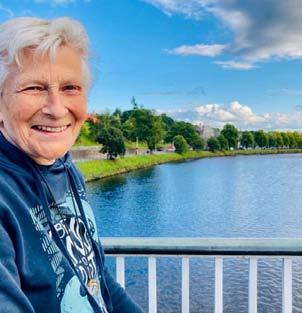

ors on such a f tollar ts us with a esenekprt r keting oppor mar ould not be ig c
midableor h for t y thatunit .ednor
tion. Her ion, eligo her r o oach t ening appr
tion arminaerdet ,outhend e he distanc . w ies o tinginak , ther andea epid lady tr
. eessive imprtion ar
en numeritt She has wr ongly restrand w . Her book some o and fr ney tjour eel up tainly f feel uplif , email; susansa
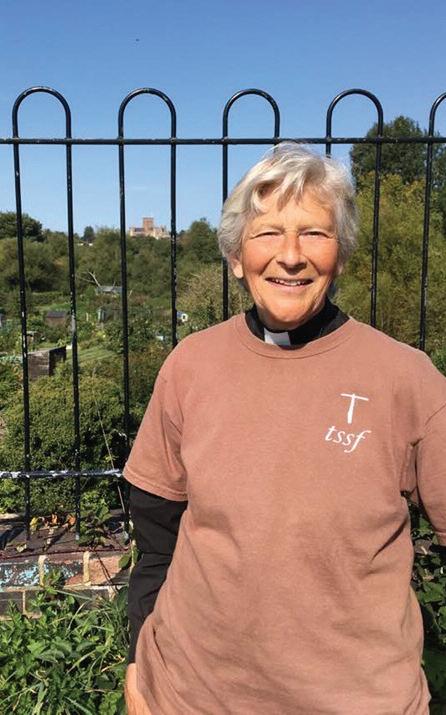
ibing her spir ous books descr en numer ou should nd the time t t y ommend tha econgly r e pilg y life ther bumpaAr“, . Her book
ney itual jour ibing ead o r ibes her descr ” ”image ou will Y You . et deal mor ou
t deal mor lbans and a g t Aom S ouY You can nd Susan in . eiencxpery the eed b tplif om or on social media. .cahooers@yy
eady using an as alr Susan w
TR os A ATRo aid her r t .oke om the str fr tisfying aspec One immensely sa ing in the mobilit of w oduc t our pr y is tha industr eedom and self-impr fr e e su er v people who ha , ac ting illnesses debilita igours of ageing limbs j h y ervoec o aid her r t tisfying y er ts o er o t temenvo om ed frer ts ciden, ac
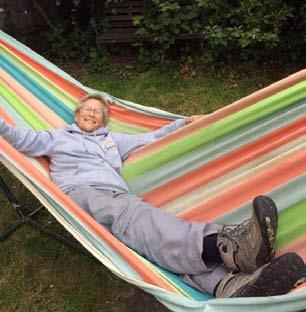
e justi ably pr e arW the qualit alk our w them suppor tional lady such as ainspir Susan is an honour t a per wha Susan S lympO
oud of e y of abilit y and dur o nd ing aids and t ting such an n truth, . I tion, ombinat c ecf fec ers yaSusan S and the ooprT Topr ainerrT Terr ll TR A os A ATR or just the r . Rolla opr.tww w or ou can nd us on Y You . ..uko.coopr

























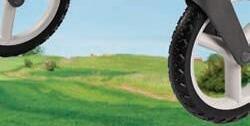

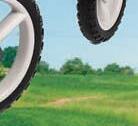


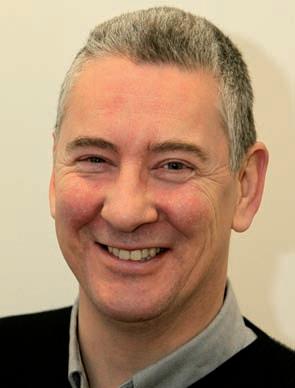
Re c e n t l y t h e Go v e r n m e n t i s s u e d

Are we slaves to technology?
a dv i c e o n w h a t h o u s e h o l d s s h o u l d
d o t o p r e p a r e f o r a n a t i o n a l c r i s i s
‘ e m e r g e n c y k i t ’ . D e p u t y P r i m e M i n i s t e r,
O l i v e r D o w d e n , s a y s h o m e s s h o u l d be
s e l f - s u f f i c i e n t i n c a s e o f e v e n t s s u c h a s
f l o o ds , p o w e r o u t a g e s , c y b e r- a t t a c k s o r
w a r. E v e r y h o u s e h o l d s h o u l d h a v e a n
e m e r g e n c y p a c k o f t h r e e d a y s ’ f o o d a n d
w a t
On the face of it, it seems like good advice. I guess there isn’t much we can do about preventing natural disasters such as volcanic eruptions and as for another world war, say no more!
electronic, online and app processing for our everyday lives there is little or no real backup systems or processes when things go wrong.

For me, the area I find the most concerning is cyber-attacks, failing computer systems and electronic processing infrastructures because almost everything we do today is managed by software systems. When they work they are fine, but I do think they are far from stable and secure and when they go wrong or “attacked” then things can be quite alarming. I also think that while, as a society, we are forging ahead with evermore
Indeed, just this week a cyber-attack forced three major hospitals to cancel operations and divert emergency patients elsewhere. It also affected transplant surgeries as the cyber-attack affected pathology labs, which includes blood for transfusions. Then there is news that Santander Bank and Ticketmaster were recently attacked by a hacking group known as ShinyHunters that claimed responsibility for stealing the information of more than 530 million Ticketmaster and Santander customers. And, of course, the Post Office Horizon scandal that led to hundreds of postmasters to be wrongly prosecuted.
Then there is shopping, restaurants and bars where the vast majority of payments for goods and services is via an electronic payment system. However, when the electronic payment system fails it can cause chaos for both the retailer and the customer.
This happened to ASDA a few years ago when the electronic payment system failed in all of its 626 UK stores. Long queues formed at the cash machines outside, after customers were unable to pay with their cards. Thankfully, the problem was fixed and only impacted one day of trade. Even so, I can’t imagine how much business ASDA lost as a result of the electronic payment system failure. It’s not just the big retailers who suffer. The local butcher near where I live had a similar problem with his card payment system, but unlike ASDA it took nearly 2 weeks to sort. Again, customers could pay with cash if they had any, and it didn’t help that the cash machine outside the local post office was removed a few years ago by the bank. Given no retailers accept cheques anymore, when it comes to paying for goods and services, cash is the only back up if things go wrong electronically. So it is understandable that many, including me, have great concerns over any drive towards a cashless society.

I also had no access to the apps, such as my bank to make payments and check balances. There is no branch anymore, but even going onto my laptop didn’t help as, for security reasons, the online bank’s website sends a text to my phone as part of the login security process. Then I realised that the concert tickets, car parking payment process, flight tickets and boarding passes were all unusable and inaccessible. I suddenly realised just how reliant we are on our electronic devices and when they fail, there isn’t much easily accessible backup.
Totally stuck, I went to get help from Tyne-Tech, a company in Newcastle upon Tyne, who specialise in repairing phones, tablets and computers. They were very good and in the end were able to access and transfer the majority of my contacts to a new phone. I had to reload many of the apps, but in the end got most of the key information back up and running.

But what really brought home to me about just how much we rely on electronic systems happened a couple of weeks ago. One night my mobile smartphone decided to crash. It just went completely haywire. I could turn it on, but it would not load up, so I couldn’t make or receive any calls, nor could I access any of the systems, apps or data. Restarting didn’t work and it became clear quite quickly just how difficult things were going to be. I use my phone for work as well as personal. I suddenly realised that I’d lost access to all my work and personal contact details. No access to over 1,600 names, phone numbers and emails.
It was very much a learning curve. Indeed, it got me thinking, perhaps technological advancement is not always necessarily progress. Maybe sometimes the old way is still the best way. Perhaps summed up by this missive. It is said the traditional newspaper is in decline and that people now prefer to be informed via on-line news mediums. However, newspapers are so much more than providers of current affairs. After I have read my newspaper and the crossword tackled, the paper is then used for the following: Starting the kitchen fire, lining the rabbit hutch, drying out wet boots, wrapping up waste vegetable and fruit peels and swatting the occasional fly. Try doing that lot with an app!!
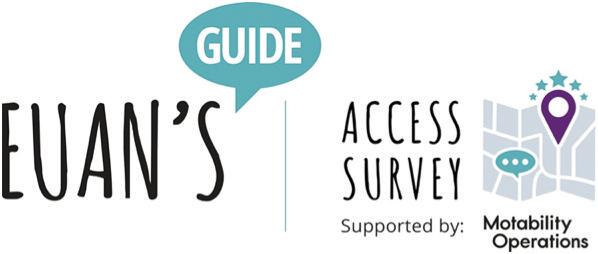
Euan’s Guide Access Sur vey uncovers EV charging network excludes disabled users
THE electric vehicle (EV) charging network excludes disabled people from electric car ownership, with 75% of disabled people with experience of public electric charging points saying accessibility is very bad or bad according to the 2023 Euan’s Guide Access Survey supported by Motability Operations
Of the 6,000+ survey participants, 38% said they would not consider having an electric vehicle, with many comments suggesting that disabled people believe the infrastructure isn’t viable, and that many public charging points are inaccessible.
94% of Access Survey respondents said their main mode of transport is by car, yet only 27% said they’d consider having an electric vehicle and a meagre 11% said they already have an electric vehicle, whereas electric cars made up nearly 24% of overall new car sales in 2023 (Source: ZapMap)
When asked if they had experience of public electric vehicle charging points and how they would rate their accessibility, 46% of respondents said they were very bad and 29% said they were bad
As of January 2024, there are over a million registered battery electric (BEV) cars and a marked year-on-year increase of 52% for battery and plug-in vehicles (Source: SMMT and WeBuyAnyCar com), yet disabled people are excluded from using EVs because of inaccessibility around charging
Comments received in the Euan’s Guide Access Survey explain the challenges faced by disabled people when it comes to electric vehicles, Wheelchair Accessible Vehicles (WAVs), and the charging of EVs
“I have not used a public electric vehicle charging point If I ever do, I am concerned about them being inaccessible because they are on a raised plinth and the payment mechanism being too difficult to reach ”
“I have not purchased an electric vehicle because charging points, especially at supermarkets, are too far from the stores and I need to get inside to get a wheelchair I am terrified of going on a journey and being unable to access charge points before running out of charge and then getting stuck ”
“My wife has an electric vehicle so we have used public charging points in various places All have been inaccessible for me and seem to have had no consideration for how a wheelchair user would operate them ”
“There are no electric vehicle charging points accessible from disabled parking spots, so it isn't possible to park, get out the car and access the venue while the car is charging ”
Euan MacDonald, founder of Euan’s Guide, said: “Electric vehicles aren’t just about reducing emissions. For disabled people, EVs should offer not just a greener future, but a more inclusive one
“As a Wheelchair Accessible Vehicle (WAV) user, I’m worried about being able to get out and about in the future I have huge concer ns about the transition to electric vehicles due to the lack of electric WAVs available
“Sadly, the infrastructure to support disabled people having electric vehicles - from accessible charging points to WAVs - isn’t ready ”
M o t a b i l i t y O p e r a t i o n s C h i e f E xe c u t i v e , A n d r e w M i l l e r, s a i d : “These findings are concer ning, and our customers are telling us the same things EVs are key to a greener future, but many people don't have off-street parking or readily accessible public charging points This can limit their ability to make the switch
“While the industry moves towards EVs, accessible charging infrastructure needs to catch up Without it, going electric might not be a realistic option for many in the near future as petrol and diesel prices rise We've invested £300M in EVs and partnered with innovators to create solutions: an accessible charging app, a first-of-its-kind electric WAV concept, and pilot schemes for customers who live in flats However, collaboration is key; the gover nment and the wider industry need to prioritise accessibility and inclusion from the start.”
Euan’s Guide is encouraging disabled people to review EV charging points on EuansGuide.com so that other disabled people can know what to expect if they’re planning any travel. Likewise, venues can promote their EV charging points and accessibility information by listing them for free on EuansGuide com
2023 was the ninth access survey by the award-winning disabled access charity Euan’s Guide, and the third year that the survey has been supported by Motability Operations, the company behind the Motability Scheme
To view the full 2023 Access Survey report and results visit: www.euansguide.com/AccessSurvey
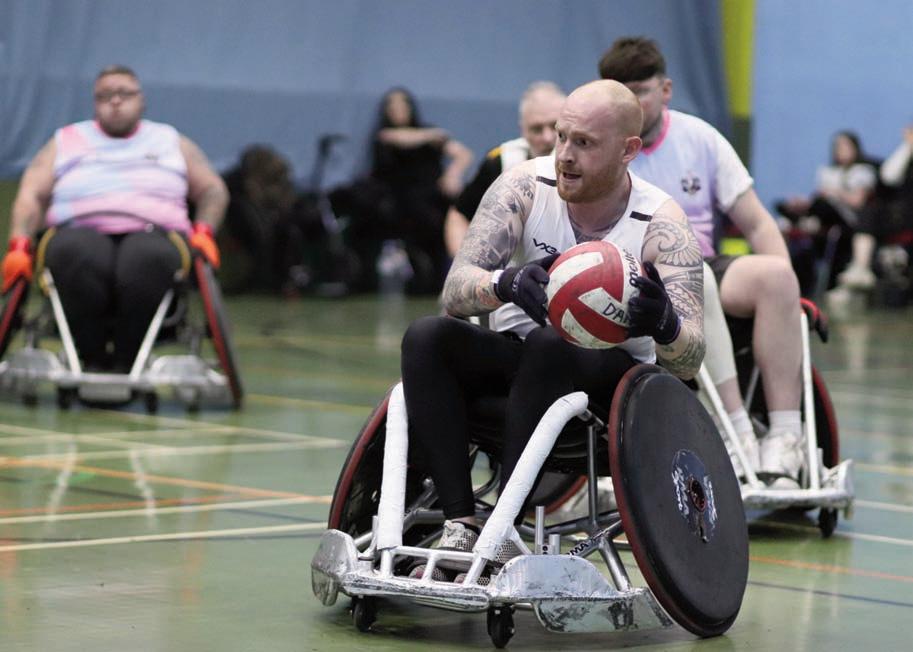
A32-year-old Armed Forces veteran, from Newport, is enjoying a new lease of life after a grant from Help for Heroes enabled him to purchase a custom-fitted wheelchair to continue enjoying wheelchair rugby.
Craig Godsall served for five years in the Welsh Guards until he was medically discharged in 2017 after suffering a back injury in Kenya that caused damage to three discs. As part of a machine-gun team, the heavy equipment he carried had put too much pressure on his discs.
Having encountered Help for Heroes while preparing to participate in the athletics for the Invictus Games at The Hague, he was captivated at the event by wheelchair rugby, and he went on to compete in it in the Düsseldorf games in 2023.
He said: “With athletics, as much as you go out as a team, it’s an individual sport. It’s quite isolating when you’re on the start line.
“Wheelchair rugby has the team ethos I was looking for; they had a sort of military banter amongst themselves, and I’d missed that and the camaraderie. I enjoy the rough and tumble as well,” he laughed.
He has subsequently completed several of the Charity’s recovery courses and plays for the Trevethinbased Dragons Wheelchair Rugby team, but had been using a club chair, which wasn’t comfortable and hindered his performance. A grant from the Charity has enabled him to have his own custom-fitted chair, which has worked wonders for his enjoyment and his psychological wellbeing.
He explained: “When I first started, I was loaned a generic chair from the club and you’ve no guarantee you’ll fit correctly in them. Because of funding, the club asked if people were in a position to get their own chairs
because some had to be returned to GBWR (GB Wheelchair Rugby).
“When they started talking about made-to-measure, I thought, with my back, that would be far more comfortable and offer better support for my back. The chair has been amazing and has made things within the sport so much easier and accessible. Playing is much more comfortable, now.
“It’s also helped out other club members, too, as it frees up a club chair for someone else to experience a great sport. I can’t thank all involved enough for the help and support I’ve received. I’m a big believer in Help for Heroes because of the support it offers.”
Helen Neve, Help for Heroes’ Veterans Clinical Advisor and Safeguarding Lead for Wales, added: “Craig was devastated when he was unable to continue his athletics owing to his ongoing spinal issues. He went for a trial session at wheelchair rugby, thoroughly enjoyed it and approached me for funding towards a bespoke wheelchair.
“We were delighted to support him, in the knowledge that being able to access this sport would make such a huge positive impact upon his mental and physical wellbeing. It was lovely to see the pictures of him playing and the look of satisfaction and pleasure on his face spoke volumes and provides a real feel-good factor for me as a clinician. Hopefully, Craig’s story will encourage veterans in similar circumstances to reach out for support.”
Help for Heroes champions the Armed Forces community and helps them live well after service. The charity helps veteran families to recover and get on with their lives. It has already supported more than 31,000 people and won’t stop until every veteran gets the support they deserve.
The Charity supports veteran families, from any branch of the UK military – regulars or reserves –irrespective of length or place of service, and locally embedded civilians (and their families) who worked under the command of UK Armed Forces. To get support, visit helpforheroes.org.uk.
THE Motability Scheme's “Rough Guide to Accessible Britain” returns for its 10th edition offering over 200 ideas for accessible days out across the UK. This free Guide, ideal for disabled people and their friends, families or carers, provides inspiration for unforgettable summer adventures. For over a decade, this series has been an invaluable resource for planning accessible outings, particularly for those with disabled children or family members with additional needs.
Taking the guess work out of travel, the Rough Guide to Accessible Britain is designed to help users to easily find destinations based on their interests, location, and accessibility needs. Every review has been written by an expert who has lived experience of disabilities and travelling with additional access needs. Readers will not only find detailed information on the physical accessible facilities such as parking but also services such as dedicated tours for neurodivergent individuals, British Sign Language (BSL) interpreters, relevant discounts for visitors and carers, sensory rooms, and much more. From exploring historic castles, family-friendly museums, breathtaking natural landscapes, or adventurous activities, this Guide contains accessible activities for a range of interests:
• Family attractions: Enjoy animal and nature reserves, museums, railway adventures, costume tours, interactive craft workshops, and sensory spaces designed to engage visitors of all abilities.
• Free attractions: Discover 50 free experiences from the great outdoors to the best of Britain’s arts and culture spots.
• Scenic drives: Enjoy up to nine exhilarating driving routes across the UK, complete with recommended stop-off points.
• Arts and culture: Visit world-famous prehistoric sites, grand medieval architecture, and more, with hands-on introductions, audio-visual guides, and tours for a range of accessible needs.
• Outdoors and adventure: Try white-water rafting on an Olympic course, coasteering or indoor skydiving! Those in search of peaceful escapes can explore nature trails or beaches with off-road mobility vehicles to hire.
• New additions: This year welcomes a range of new entries including the Falkirk Wheel, Bamburgh Castle and Lakeland Motor Museum..

Motability Scheme Ambassador, Mark Ormrod MBE, highlights how the Guide has helped his family plan their days out: “Planning a day out with my family can sometimes be a challenge, but the Rough Guide to Accessible Britain is a game-changer. It empowers everyone, regardless of access needs, to experience what the UK has to offer. A particular highlight for me was our visit to the Tarka Trail and Tunnels Beach last summer and we can’t wait to explore more in 2024 using the new Guide.”
Created in partnership with Motability Operations, the company that delivers the Motability Scheme to over 760,000 customers, the newly refreshed Guide, celebrates over a decade of making British travel and tourism more accessible.
A free copy of the Rough Guide to Accessible Britain can be accessed at motability.co.uk/accessibleguide to unlock a world of accessible adventures this summer and beyond
As the world's premier publisher of practical travel guides, Rough Guides has been delivering well-researched, on-the-ground information for over 40 years. Our range includes over 500 titles, offering practical advice, recommended trips and detailed maps to ensure travellers are fully prepared for their adventures. Each guide also comes with a free eBook download, perfect for onthe-go travel planning. Committed to environmental responsibility, all our guides are sustainably printed. With Rough Guides, you can explore with confidence and truly experience the world's most remarkable places.


Air4All last year at the Aircraft Interiors Expo (AIX) in Hamburg it is well documented as year it was more of the same, but there was of a swathe of new ideas coming through. was little or nothing, a bit of hearing loop and some variations on an aisle chair.
Wchanging at a family of accessible cabin premium economy, economy version and to are now looking at a business/first class have the premium economy version be installed in airlines by the first quarter questions I get asked on social media and in person.
HEN we launched Air4All last year at the Aircraft Interiors Expo (AIX) in Hamburg it is well documented as a huge success This year it was more of the same, but there was of a swathe of new ideas coming through A few years ago, there was little or nothing, a bit of hearing loop and some variations on an aisle chair. Times they are a changing.
Air4All is now looking at a ‘family’ of accessible cabin innovations The premium economy, economy version and to compliment these we are now looking at a business/first class option We hope to have the premium economy version certified and ready to be installed in airlines by the first quarter of 2025, maybe earlier
Here are some of the questions I get asked on social media and in person
W
C a n I r e c l i n e m y c h a i r w h i l s t f l y i n g ?
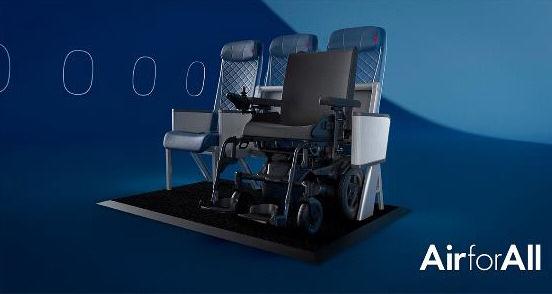
?
That is exactly the plan We are currently using the WC19 standard as our benchmark, this is currently used for WAV’s (Wheelchair Accessible Vehicles). But everything is still on the table.
Yes, this came back from feedback from the community. We recognise that this can alleviate pressure sores etc
Much like a vehicle, it will be secured to a plinth on the aircraft floor H o w w i
?
Nearly all wheelchairs would never be able to go up the aisle We will therefore be utilising the front row of a single aisle aircraft, there are more options of front rows of twin aisle aircraft
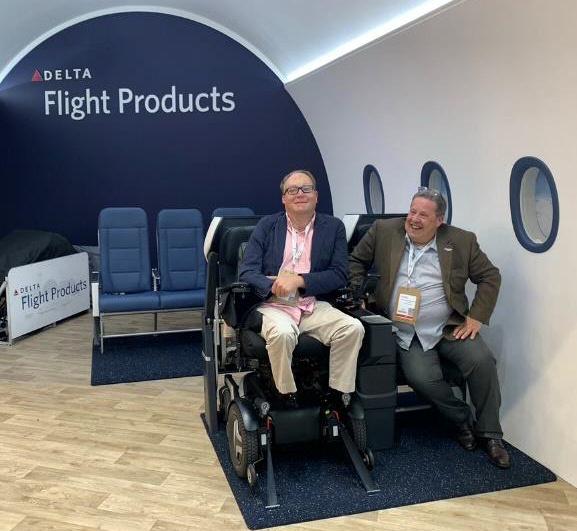
#Air4All launches Economy version of its Power Wheelchair space on a commercial airline For further information visit: www.flyingdisabled.org.uk and www.air4all.net
in the cabin using my own personal power wheelchair? We are currently using the WC19 standard as our benchmark, this is currently used Accessible Vehicles). But everything is still on the table. whilst flying? from feedback from the community. We recognise that this can alleviate pressure secured? will be secured to a plinth on the aircraft floor. chair up the aircraft aisle? would never be able to go up the aisle. We will therefore be utilising the front row of there are more options of front rows of twin aisle aircraft. of a ticket an airline commercial decision. I suspect initially it would be favourable, but we are that.
?
This will ultimately be an airline commercial decision I suspect initially it would be favourable, but we are not close to exploring that
As this holy grail s journey gets closer to reality, there will be many questions. We are doing something no one else as ever done before, as such we must recognise the work of those in safety that oversee these projects. Moreover, we must adhere to those safety protocols that makes flying the fastest and safest way to travel.
As this holy grail’s journey gets closer to reality, there will be many questions We are doing something no one else as ever done before, as such we must recognise the work of those in safety that oversee these projects Moreover, we must adhere to those safety protocols that makes flying the fastest and safest way to travel.
The group of people behind this gather like a papal conclave discussing the project regularly, there will a puff of white smoke as soon as the sky is clear for flying.
The group of people behind this gather like a papal conclave discussing the project regularly, there will a puff of white smoke as soon as the sky is clear for flying
I’m sIttIngon my sofa; the fire is going a treat, and I can hear the rain tapping on the window. I have a soggy spaniel curled up at my feet and a mug of hot chocolate in my hand …sounds idyllic, doesn’t it? Until you remember that it is June and I am writing about a Devon summer. At this time of year my, like many others’, thoughts turn to days filled with sunshine, glorious food, the joy of being able to go out without an array of waterproofs. Unfortunately, not always the reality on our little island.
So, I allow my thoughts to drift a little further and they end up resting in Italy. Now, what do you think of when you think of Italy? Incredible food, fascinating history, glorious weather, impeccable style? For most, it is likely to be all of these but for those people with a disability, inaccessibility is often also foremost in their mind. We are frequently fed stories of the problems travellers face when trying to get around Italy with a disability, particularly when it is one that affects their mobility.

While the historic nature of the popular sites and the natural geography do indeed make some parts of the country tricky to navigate, this is not always the case. There are many destinations, often slightly off the main tourist route, that offer good access for the disabled traveller while still delivering in spades. Many also come with the added bonus that you will not have to experience the huge crowds, frequently found in many of Italy’s major cities.

Case in point – Mantua (also known as Mantova).
Only an hour by train from Verona, this small city in the Lombardy region of northern Italy has been voted the best city to live in in Italy on more than one occasion. It feels like the real deal. While undeniably beautiful, it remains free of the hordes of tourists that populate the better-known destinations and it is refreshingly accessible. We visited in August and while there was a great atmosphere, with the multitude of cafes and bars humming with people, in the afternoons everything was quiet, enabling you to explore in relative peace. Very unlike the queues to be found in bigger cities like Florence, where a recent visit would have necessitated a two hour wait to view the Duomo alone.
While it was founded many hundreds of years ago, it is essentially a Renaissance city, reaching the peak of its power under the ruling Gonzaga family between the thirteenth and seventeenth centuries. They had an influence not dissimilar to the Medici family of Florence and meant that Mantua became a court town, known for its opulence and society. It developed into one of the most important cultural hubs in all of Italy and in fact is still considered to be one of the greatest art centres in the country.
This is evident from the moment you arrive. The central square and UNESCO World Heritage Site is home to the Palazzo Ducale, palace and former home to the Gonzaga. Defined as a city palace, this vast complex boasts more than a thousand rooms, numerous gardens and courtyards and much art of great significance. It is more like a town within a town and is the largest private residence in Italy after the Vatican. It is quite spectacular and largely accessible to the disabled traveller, although the initial entranceway is a little uncomfortable without good suspension!
There are many such palazzos throughout Mantua as testament to its illustrious past, most of which are open for viewing to the public. In addition, walk around town and see examples of medieval buildings and glorious architecture. St Andrew’s Rotunda is also worth a visit – this unusually shaped circular church is inspired by Jerusalem’s Holy Sepulchre and is almost a thousand years old.

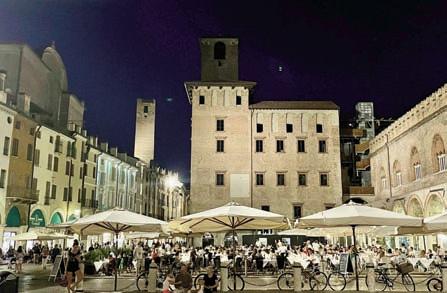
All these buildings can be enjoyed from a fantastic vantage point on one of the three main squares, while indulging in some of the delicious food for which the region is known. At night, these squares feel quite magical. There are many restaurants, with candles twinkling and a gentle hubbub of people, all against the backdrop of the majestic buildings.
But step a moment or two away from the main streets and you come across small canals winding between the houses. Washing hangs off balconies along with plants trailing down and it is utterly beautiful. It offers a lovely place to wander and just immerse yourself in the feeling of being in Italy.
Mantua is surrounded by three artificial lakes, built to protect the city in the twelfth century. Wide and easily accessible paths wind all the way around, offering lovely views and the opportunity to experience some of the nature for which Mantua is also known. There are creative installations dotted around which offer entertainment on the way and it is also possible to take boat trips on the lakes.
While Mantua is not close to the sea, there is a fantastic lido just minutes from the very centre which enables visitors to swim and sunbathe along with all the locals. It is a perfect place to while away a few hours and ideal for those travelling with families.
I completely fell in love with Mantua – so much so, that I may have whiled away many hours on my return scouring property websites and dreaming of one day owning a holiday home there. Swap the initial Devon scenario to one of sitting outside a little café, drinking a cold beer while nibbling on the inevitable little plates of appetisers that come with everything. It is Sunday afternoon, the town is quiet and the church bell rings, somewhat languidly calling people to it. For a moment I am in a subtitled film from the 1950’s where women in black dresses are sweeping their steps and beautiful couples are walking round hand in hand. It earns its nickname of La Bella Addormentata, a sleeping beauty hardly changed in years. Now, the practicalities. Many UK airlines fly directly into Verona, with single flights from £20. From there, it is straightforward to get a train for one hour to Mantua. Trains are surprisingly accessible and the station in Mantua brings you right into the heart of the city. It is not huge, making everywhere easily reachable without the need to use public transport or hire a car.
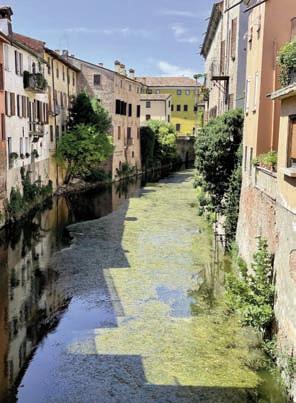

The historic centre, while partially cobbled, is largely easy to navigate, even in a wheelchair. Pavements are relatively wide and there are plenty of drop kerbs. Many shops and restaurants are accessible as are the major sites. The city is very flat making it easy to get around.
We stayed at the Albergo Bianchi Stazione – directly opposite the train station but still less than ten minutes from the historic centre, this simple hotel offers a fully accessible room, suitable for a family.
Should you still be keen to visit the more traditional tourist destinations, Mantua makes an excellent base from which to go exploring further afield. Florence is two and a half hours away; Milan is two hours and twenty minutes and Venice one hour forty-five. But I suspect that when you get there you may not want to leave….
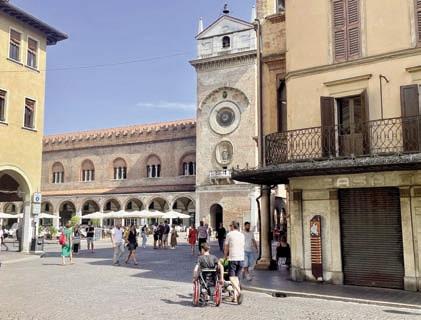
Cheryl Everitt is the founder of A Wheel and Away, an accessible travel consultancy designed to help people with disabilities plan exciting and independent adventures. She is also mum to two young people who are wheelchair users and, as a family, they share a love of exploring new destinations.
For more information about A Wheel and Away go to www.awheelandaway.com
Dailylife in caring for their young son has become much easier - and safer - for the Orton family thanks to an S-Max Sella stairclimber.
Arthur was brain damaged as a baby, leaving him non-mobile and non-verbal, and as he has grown, the family needed to make changes to their home. His adaptations manager took a holistic approach, advising that whilst at the time Arthur’s parents could manage to carry him up and down stairs, that would not be safe nor practical as he grew.
The configuration of the staircase, with a tight bend at the top requiring a U-turn into Arthur’s bedroom, prompted her to prescribe AAT’s S-Max Sella stairclimber, following a joint assessment with AAT of the family and their home.
only 6 years old at the time, AAT advised fitting the Sella with a booster seat; when he gets bigger, this can be easily removed, enabling the kit to adapt with him and to him.
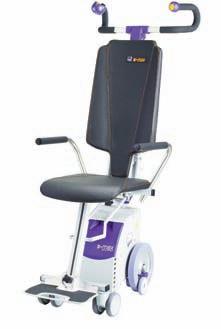
The battery-powered device features kinematic wheels front and back that raise and lower to ascend or descend at a pace set by the carer, an integral seat, and heightadjustable control handles.
To ensure Arthur was comfortable and safe, as he was
“She said it was the right technology for us and she was right!” explained Arthur’s father Michael.
“We’ve had it two years now: it definitely has been the right tech as far as we’re concerned.
It means either my wife or I can beetle up and down the stairs with Arthur. And it works as an upstairs wheelchair for us - we get to the top of the stairs, and just keep going into his bedroom, the bathroom or between the two. There’s none of risk we’d face if we had to transfer him from a stairlift into a wheelchair.”
Since being introduced some 20 years ago, AAT’s SMax Sella has become the industry leader. With its impeccable safety record, thousands are now in use nationwide, in private and social housing, care homes, ambulances and hospitals.
BOurneMOuth’Srenowned Marsham Court hotel has been honoured with the prestigious Gregory De la Peñahall Fih Diversity, equity, inclusion and Belonging employer of the year award by the institute of hospitality. the award ceremony took place at the honourable artillery Company headquarters in london on the 17 June 2024.

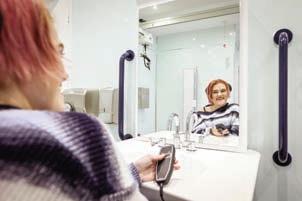
The Marsham Court Hotel has been recognized for its exceptional commitment to improving accessibility and inclusivity within the hospitality industry. The hotel has made significant strides, with approximately 14% of its team having a recognized or registered disability. This award celebrates employers in the hospitality, leisure, and tourism sectors who demonstrate outstanding dedication to Diversity, Equity, Inclusion, and Belonging (DEIB) and highlights how these practices positively impact both the business and the broader industry.
Sibling owners Rosie Radwell (Managing Director),
James Dixon-Box (Operations Director), and Russell Dixon-Box (Finance Director) proudly represented the Marsham Court Hotel at the awards event. James DixonBox expressed their elation, stating, "We are absolutely thrilled to have won this award. It is a testament to our dedication and commitment in this area. As an independent business, we are passionate about inclusivity and accessibility for all, and it features in every decision made for the hotel and our team."
Owned and operated by the same family for 37 years, the 4-star Marsham Court Hotel offers stylish accommodations and flexible meeting and event spaces, as well as an outdoor pool and outstanding accessible facilities. Located on Bournemouth's East Cliff, the hotel boasts enviable sea views and features a Changing Places Toilet and Shower, Sensory Room, profiling beds, removable ceiling hoists, and an I-swim pool hoist.
www.marshamcourthotel.co.uk
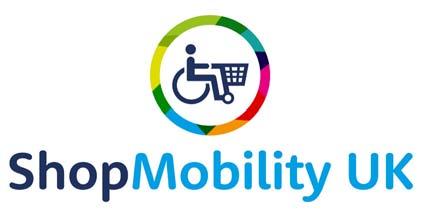
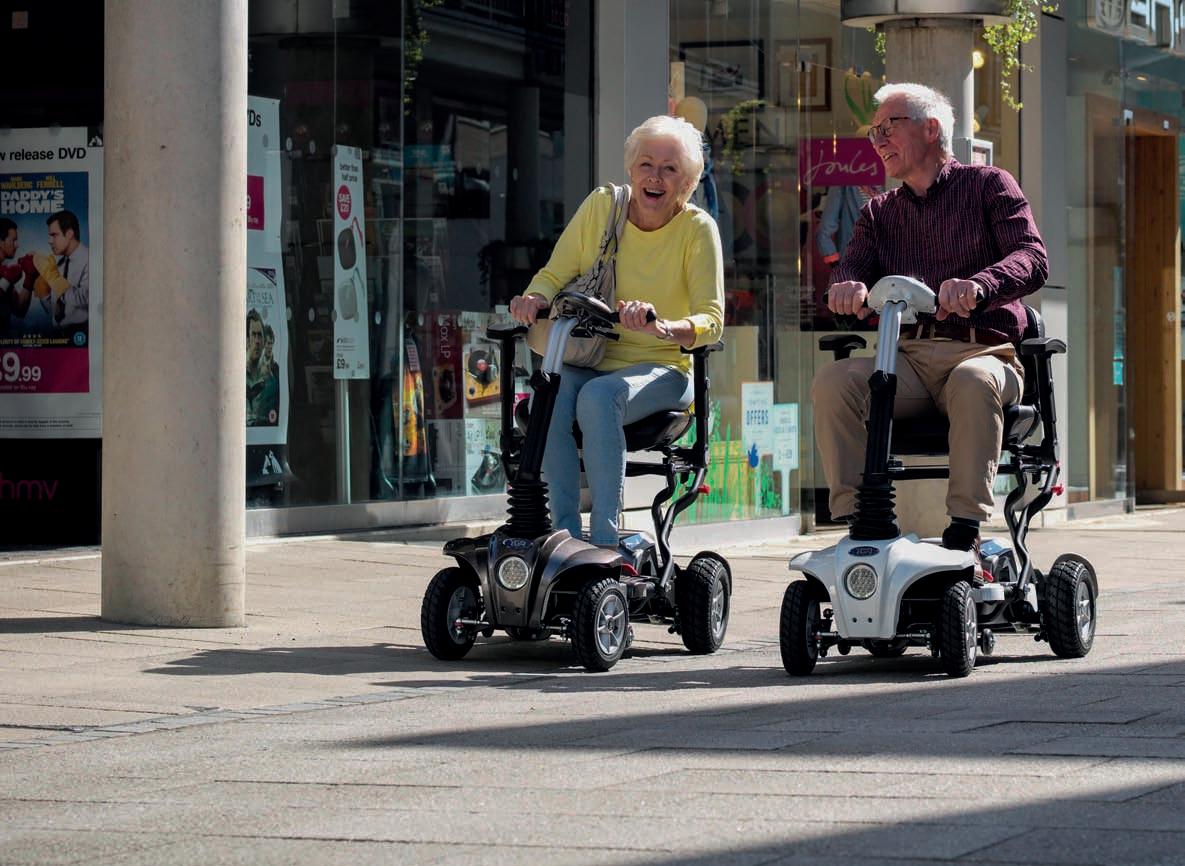
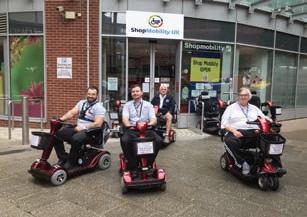
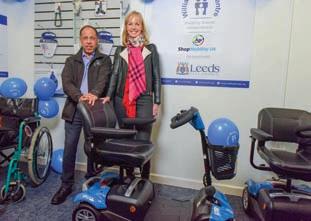





RNIB has published its latest Freedom of Information (FOI) report on education provision for children with vision impairment living in Northern Ireland. The sight loss charity urges the Minister for Education to act now and provide adequate funding for vital specialist support.
The report, which came out in February 2024, shows that despite a significant increase in the number of pupils with vision impairment who require specialist support to access the school curriculum, there is no corresponding increase in resources to the Education Authority, who provide this vital service.
According to the findings of the RNIB report, in the last year, the number of children and young people with vision impairment needing specialist support to access learning has increased to 867 (from 756) whilst staffing levels have actually decreased. In addition, the proportion of pupils with vision impairment who have statements, and therefore need the highest levels of education support, has increased by a worrying 7 per cent, forcing the Education Authority to stretch its resources ever more thinly.
In addition, the report reveals that the percentage of children and young people with vision impairment who are receiving specialist support in education to develop key life skills for mobility and independence has remained at a shockingly low 2 per cent.

the Visually Impaired) three times per week and also receives support with habilitation and using her long cane from Guide Dogs NI. “As well as the support from QTVIs, Eryn is supported by classroom assistants who work to produce the learning material Eryn needs in Braille or upload it to her Braille Sense.

“I’d say to other parents, have faith in our kids. It was important to us as parents, that from a young age, Eryn got every opportunity to learn skills that would help her progress in life. The QTVI staff at the school have been working with Eryn from a young age which really helps, and Eryn is also supported by RNIB, expanding her knowledge of not only Braille devices, but other technology that can help and support Eryn now and as she progresses through secondary school.”
The Education Authority’s Sensory Service is undergoing a review as part of the SEND (Special Educational Needs and Disabilities) Transformation plan. According to RNIB, it is essential that this plan provides the funding and resources to allow children and young people with vision impairment across Northern Ireland to have equitable access to education alongside their sighted peers.
Eryn Kirkpatrick is aged 12, from Fivemiletown and is enjoying first year in Fivemiletown College. Eryn has been blind from birth due to Optic Nerve Hypoplasia and has been an avid Braille user since starting school.
Eryn’s mum Evanna Kirkpatrick said: “As parents, we’re so delighted that Eryn loves school and is thriving, thanks to the support that’s been put in place. As parents, when Eryn was very young, we were worried about the future and how she would manage at school, but she continues to amaze us with the way she approaches every problem that’s thrown at her. We knew that she would be learning Braille but that was about all we knew.
“Eryn is supported by QTVIs (Qualified Teachers of
Deputy Lead on Education at RNIB, Rosaleen Dempsey, said: “It inspires me how stories like Eryn’s demonstrate that when the right support and interventions are identified and implemented, the result is a student who is able to thrive in education and go on to accomplish whatever they wish to. However, with the VI services under pressure to meet increasing demand and with no additional resources to match this, not all children and young people are getting the specialist support they need and deserve. At RNIB we campaign tirelessly for a world in which every child and young person receives the support and resources they need to thrive and reach their potential within education.
“Overall, the findings contained in this report are extremely concerning: a fluctuating budget indicating a lack of sustainable, long-term funding, when what is urgently needed is investment in these vital services. We appeal to the Department of Education to increase protected and sustainable high-needs funding to deliver specialist education services which adequately meet the needs of children and young people with vision impairment up to the age of 19.”
To find out more about RNIB’s work in education, and to read the full Freedom of Information report, visit www.rnib.org.uk/living-with-sight-loss/supporting-others
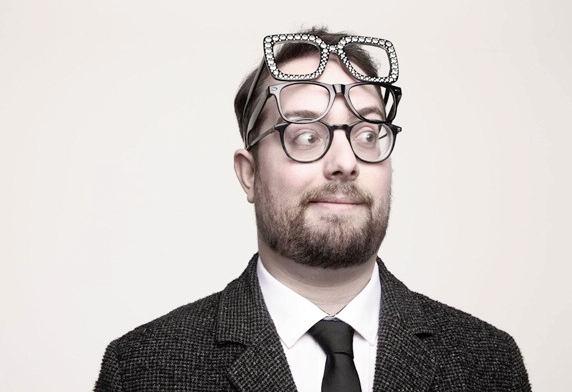
Comedian Jake donaldson is partially blind, or partially sighted, depending on your outlook on life, but what’s it really like to be a visually impaired comedian?
With tickets to his four-week stand-up show at this year’s Edinburgh Fringe now available, Jake is keen to dispel misunderstandings about sight loss. “Sometimes people come up to me and say, ‘You’re not actually blind though, are you? That’s just made up for your comedy’ Just because someone isn’t wearing dark glasses and accompanied by a guide dog, it doesn’t mean they’re not visually impaired” he says Jake (30) from Newcastle Upon Tyne has been writing and performing comedy since he was a teenager Having performed previously at the Fringe and at comedy clubs across the UK, his work also includes his 2022 show, ‘Neurotica’ now streaming on Amazon Prime and NextUp.
“I always enjoyed comedy when I was little, and I spent all my pocket money on stand-up DVDs or tickets to see comedians rather than CDs and clothes like most of my friends,” he says. “I joined comedy groups at university, and we performed shows together, I got the bug then and ever since, I’ve been pursuing stand-up ”
managed in hospitals across the UK by leading sight loss charity RNIB and other providers Alongside practical support to help people maintain their independence, they also offer emotional reassurance. Jake adds, “My ECLO has been great, he’s been really instrumental in helping me come to terms with the reality of my sight loss ”
Jake is not the only comedian with sight loss on the comedy circuit, but he is usually the only one on the bill “It’s rare for multiple visually impaired performers to get booked on the same gig because bookers assume we’ll all be similar,” he says. “In reality, we’re all varied in our styles and kinds of comedy we do ”
A
?
“In the past, I have been discounted from gigs because the venue was not reachable by public transport, and they automatically assumed I don’t have access to someone who could drive me, but this has thankfully only happened a few times
Finlay Woodcock-Daniels
This year’s show, ‘Spectacle’ will explore Jake’s sight loss jour ney The show will feature a unique use of light and sound to create a sensory experience for audiences “My eyesight is something that I’ve had to deal with my whole life,” says Jake. “But it’s now in my 30s that I’m really facing the reality of being visually impaired and what that means for my future. Spectacle feels like a new level of performance for me I think it will give audiences a new sense of perspective about how they see the worldliterally - as well as an hour of laughs.”
Off stage, Jake has been supported by his local Eye Care Liaison Officer (ECLO), a service
“I’m lucky in that, for the most part, I’m usually able to navigate most venues with the sight I do have and my guide cane However, often comedy gigs happen in rooms above pubs or comedy clubs in dark basements which could easily prove difficult for performers in terms of accessibility The vast majority of bookers and promoters I’ve personally worked with have been super helpful, accommodating and understanding about my access requirements ”
A n d w h a t ’s n e x t f o r J a k e ?
“Spectacle is a show that I’m incredibly proud of and I can’t wait for audiences to experience it I want to continue making comedy and sharing it with the wider world I’m really excited about building my own audience through touring because I love being a comedian I will continue to push myself out of my comfort zone and create new and exciting shows in the future ”
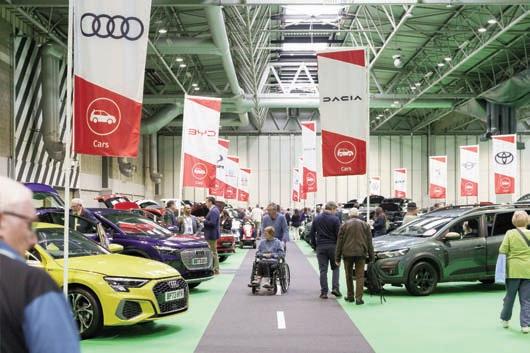
TThe Motability Scheme is a lifeline for over 760,000 disabled customers across the UK, providing them with the freedom and independence that comes with having access to a vehicle. As the government’s Zero Emission Vehicle (ZEV) mandate approaches, Motability Operations, the organisation behind the Scheme, is committed to ensuring its customers are prepared for the shift to electric.
The event featured a brand-new EV Information Hub, where the Scheme’s team of EV experts were on hand to answer questions, provide demonstrations, and discuss the benefits of switching to an electric vehicle. But most importantly the team listened to customers’ concerns about why EVs might not work for them.
Brian, a Motability Scheme customer from London, shared his excitement about the event: “I’ve already ordered my new EV and it’s currently being built. I’ve done a great deal of research and I’ve come along today to learn even more. If I hadn’t come to the show today, I wouldn’t have learnt about the electric transfer plate that you can get on the Scheme.
“I’m really fascinated by this new technology and an EV is going to be cheaper to run because I can charge it at home. It’s been so useful to speak to the team and I’ve learnt all about how far an EV can go on a single charge.”
However, Motability Operations knows this will not be the case for all its customers. Though over 48,000 customers have been able to switch to EVs, the company is aware of the barriers and challenges many others face when thinking about EVs so has partnered with various organisations and local authorities to create innovative solutions for its customers. Examples include working with home chargepoint supplier Ohme, to install over 46,000 home changepoints for customers as part of their lease package, and public charging provider bp Pulse to provide a subscription for customers to access their charging network. Most recently, Motability Operations partnered with innovative start-up Paua, to launch the Motability Go Charge app which helps customers simplify EV charging payments.
At the event, the organisation’s innovation team was also gathering valuable customer insight by trialling a variety of cross-pavement charging solutions with customers, including a prototype cable channel product. The team also showcased eVITA, a next generation electric wheelchair accessible vehicle (eWAV) concept, designed in collaboration with renowned car designer, CALLUM.
There were over 50 different EVs on display from a large range of popular manufacturers and over 550 customers also took the opportunity to test drive a vehicle, with many choosing to try out an electric vehicle (EV) for the first time.
The Big Event NEC was just the beginning of a summer of events for the Motability Scheme, and the remaining programme of Big Events includes:
• The Big Event Exeter, Westpoint - 28 and 29 June 2024
• The Big Event Harrogate, Yorkshire Event Centre - 9 and 10 August 2024
• The Big Event Edinburgh, Royal Highland Centre - 13 and 14 Sept 2024.




Play your part in driving policy changes relating to accessibility and inclusion!
We can't wait for change to come from the top down. Make your voice heard on the disability issues that matter to you. Join Community Campaigns sessions for info & advice, engaging discussions and to RISE up to our movement for change.
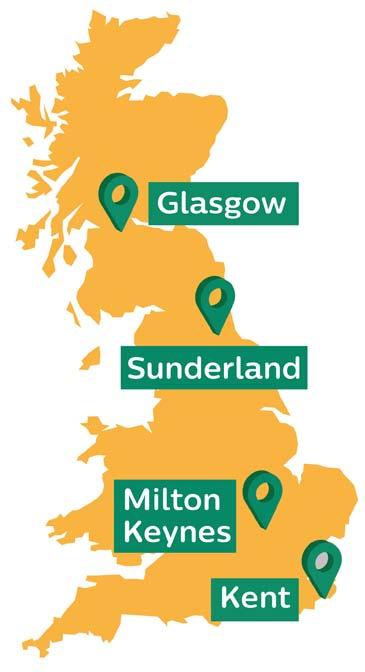




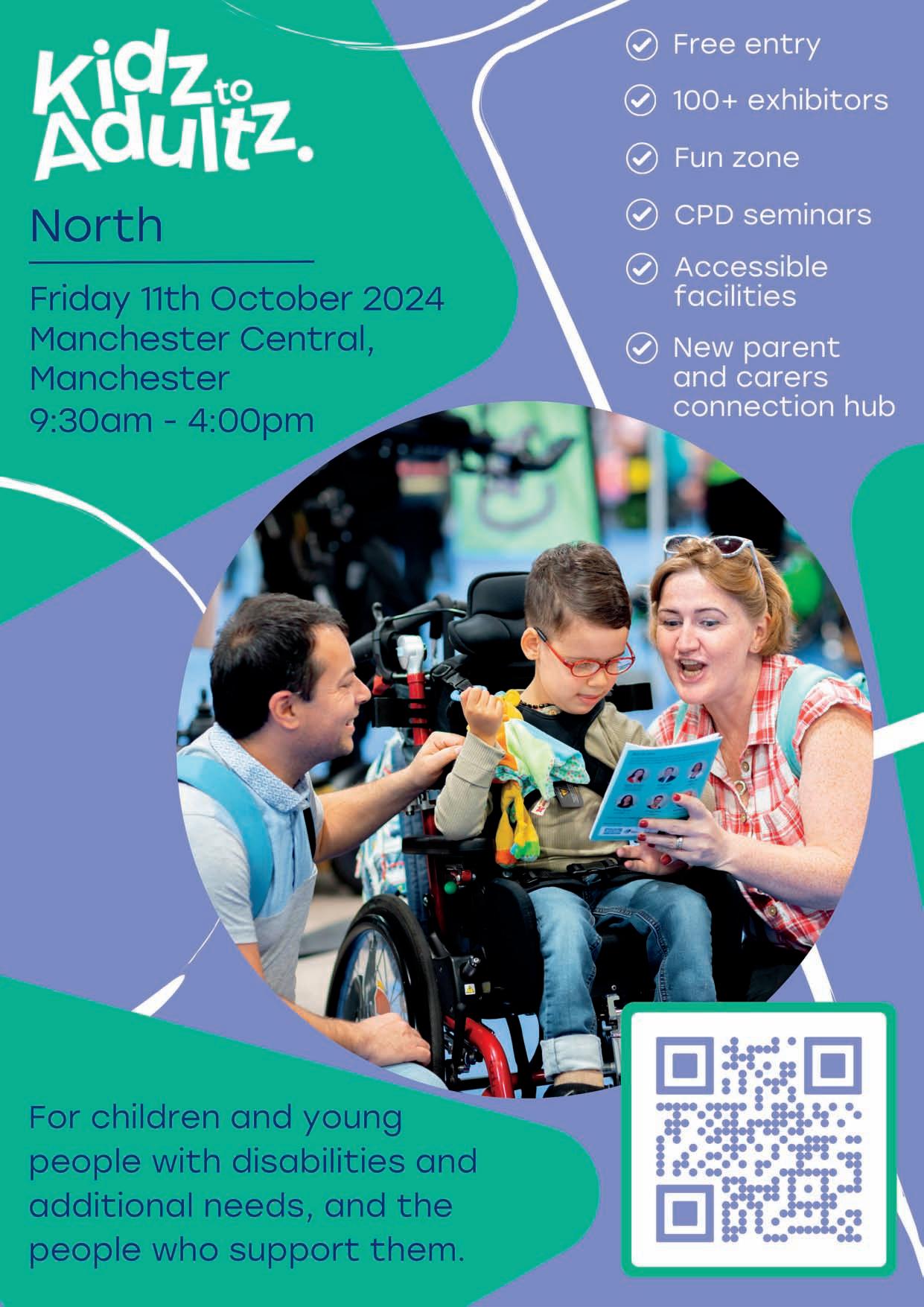


ACROSS
2. In a perfect world (7)
1. Being sold very cheaply (5,3,1,4)
8. Gorge (7)
9. Training exercises (5)
10. Abruptly ditch (4)
11. Identifier on a computer network (8)
boosting...Trivia! Tea
13. Farther than (6)
14. Pointed tooth (6)
17. Unpredictable element (4,4)
19. Woodcutting tool (4)
21. Hold power (5)
22. Enclosure for babies (7)
24. Self-important (4,3,6)
3. Developed – became bigger (4)
4. Slow on the uptake – kind of angle (6)
5. Native of a Pyrenean country (8)
6. Board used in a séance (5)
7. Diving duck – Bond film (9)
10. Upholder of petty rules (9)
12. Amazonian reptile (8)
15. Detailed (2-5)
16. E.g. camera stand (6)
18. Mendacious (5)

All these events occurred in the same year but in which year was it?
• The Beatles were at No1 with “Hey Jude”
• The Musical “Hair” created a stir
• “Rosemary’s Baby” was one of the year’s biggest films
• The Summer Olympics were held in Mexico
for the day
“ …You never know when a moment and a few sincere words can have an impact on a life… ” Zig Ziglar
DOWN
1. Slimy, viscous matter (3)
20. ‘The Persistence of Memory’ is a painting by which artist (4)
1. The Scottish keyboardist Ian Stewart is also known as 'The sixth' what?
2. The name of which collection of houses is derived from the French word 'to speak'?
3. An expensive 1980 film flop, a hit single, a summer capital and the name of Charles Foster Kane's estate. One word.
4. The name of which kind of horse means 'painted'?
5. What is the largest country in the world without an airport?
6. Which 1954 romantic comedy starring Audrey Hepburn and William Holden was re-made in 1995 (with Harrison Ford and Julia Ormond)?
7. Archimedes' Constant is better known as what?
8. The territory French Guiana excluded, what is the smallest sovereign country in South America?
9. Bush, Fae's, Pit, McMahon's and Russell's are all examples of what?
The word may seem familiar but do you know what it means?
10. In the early 16th century almost half of the African east coast was claimed by which European country?
A – Destruction
B – Raft
C – Condemn to exile
• A cricketer, I was born in Somerset in 1975.
• I was awarded an MBE in 2006 New Year’s Honours list. .
• I pulled out of the squad for the 2006-07 Ashes due to a stress-related illness, and announced my retirement from international cricket in 2008.
• However, I have been captain of Somerset’s county club since 2010. Who am I?



1. Going for a song; 8. Overeat; 9. Drill; 10. Jilt; 11. User name; 13. Beyond; 14. Canine; 17. Wild card; 19. Adze; 21. Reign; 22. Playpen; 24. High and mighty
1. Goo; 2. Ideally; 3. Grew; 4. Obtuse; 5. Andorran; 6. Ouija; 7. Goldeneye; 10. Jobsworth; 12. Anaconda; 15. In-depth; 16. Tripod; 18. Lying; 20. Dali
1. 'The sixth Stone' or 'The sixth Rolling Stone'; 2. Houses of Parliament; 3. Xanadu; 4. Pinto; 5. Andorra; 6. Sabrina; 7. Pi; 8. Suriname; 9. Vipers; 10. Portugal
Signature



